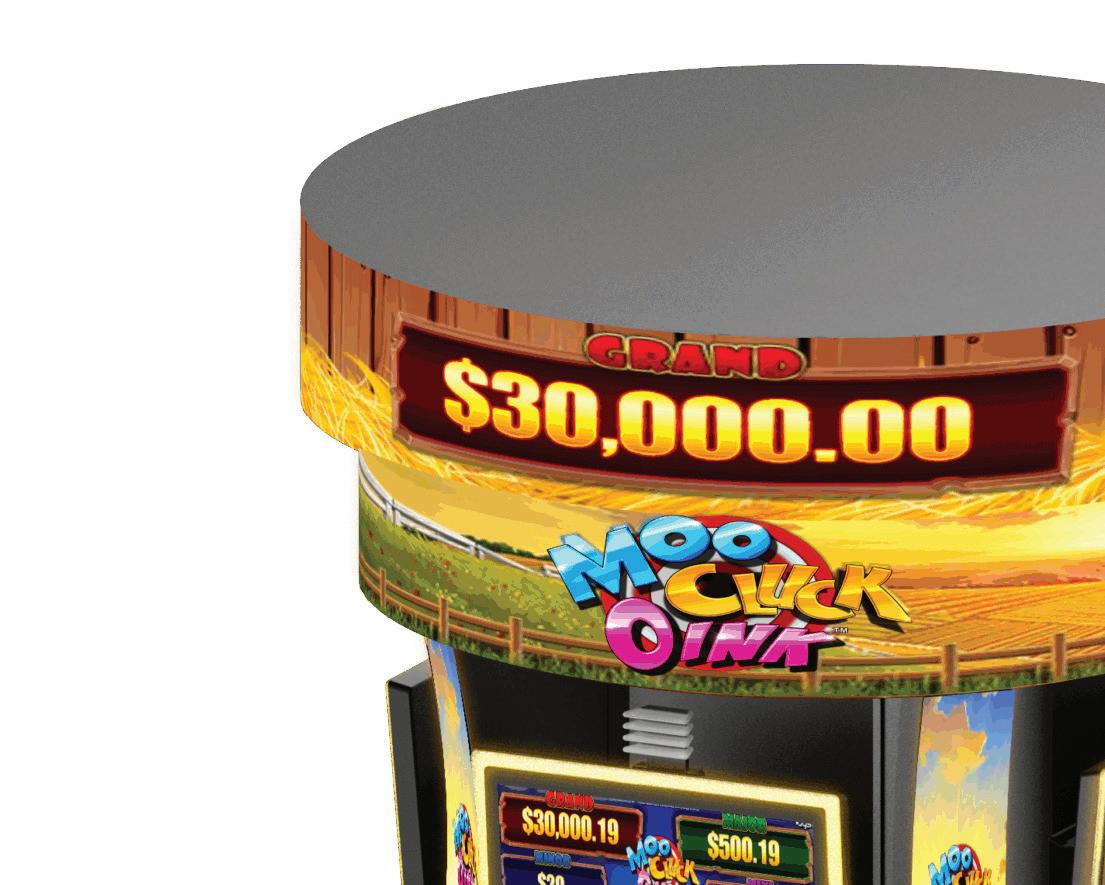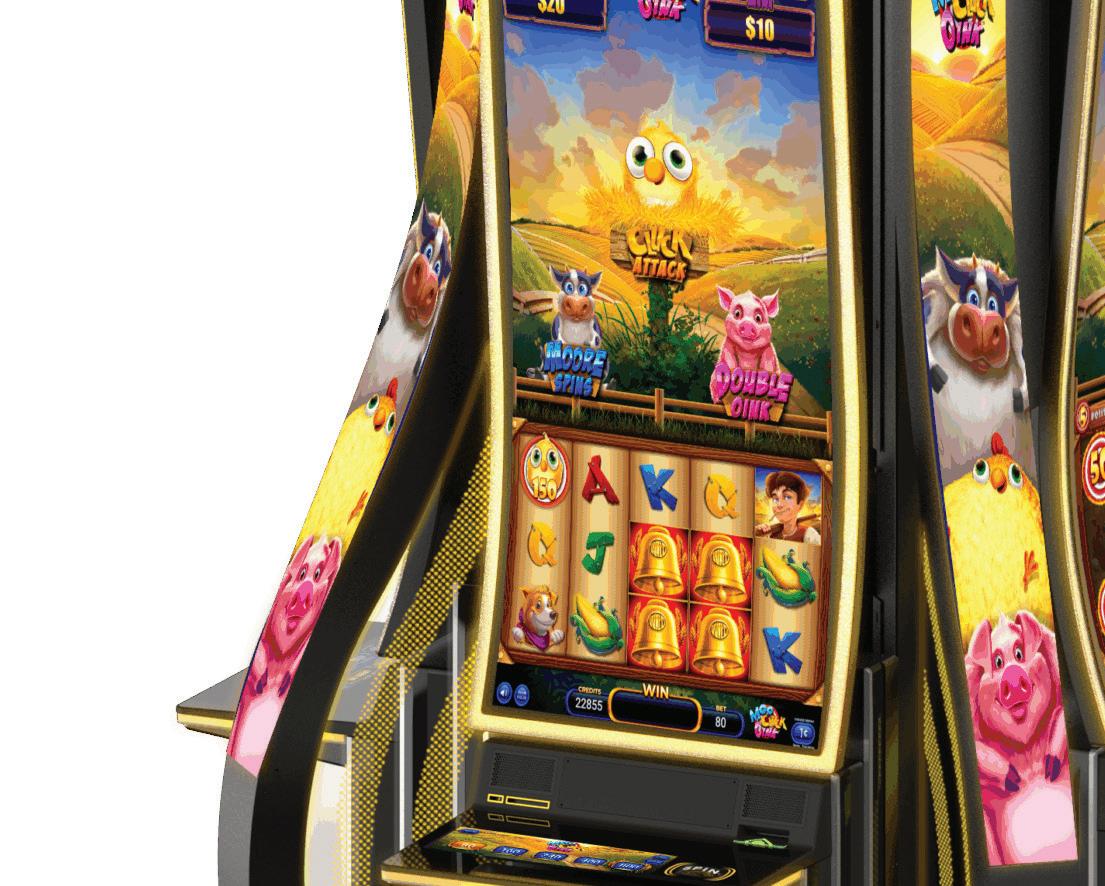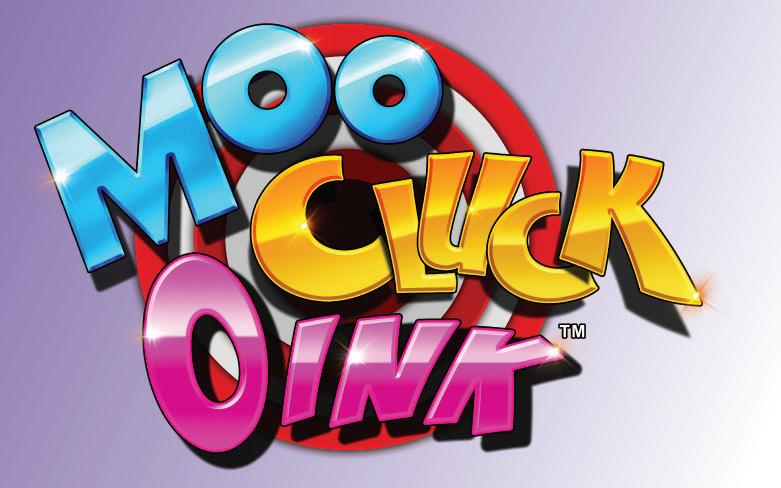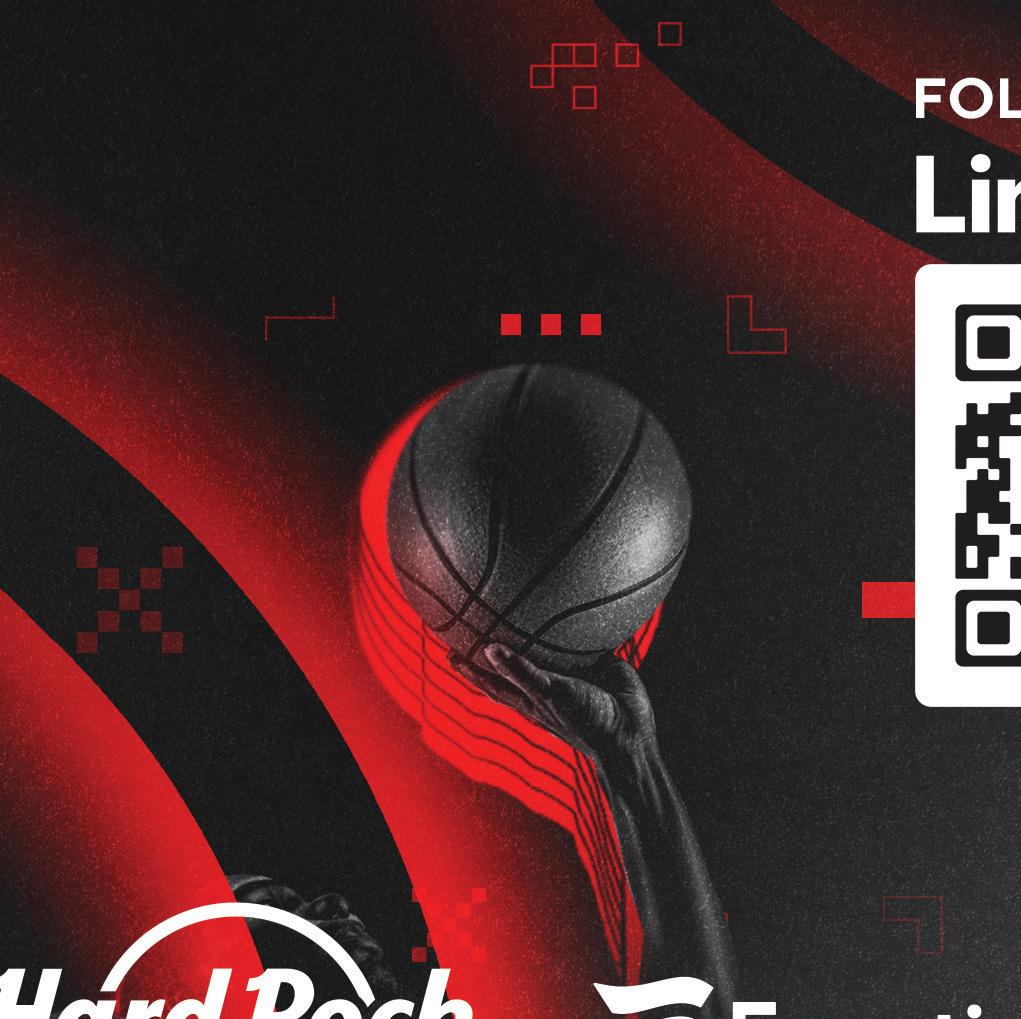

















POWERED BY





































































































































































































































































POWERED BY































































































































































































































































































































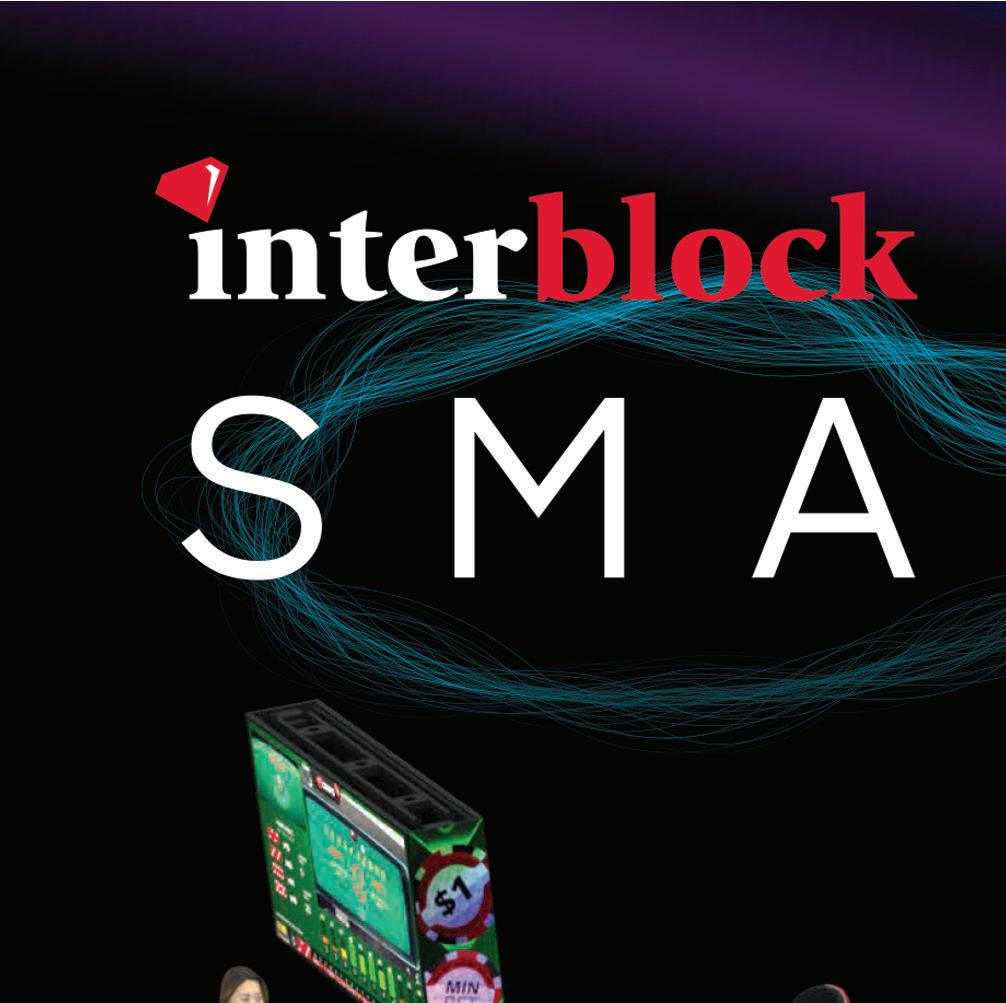
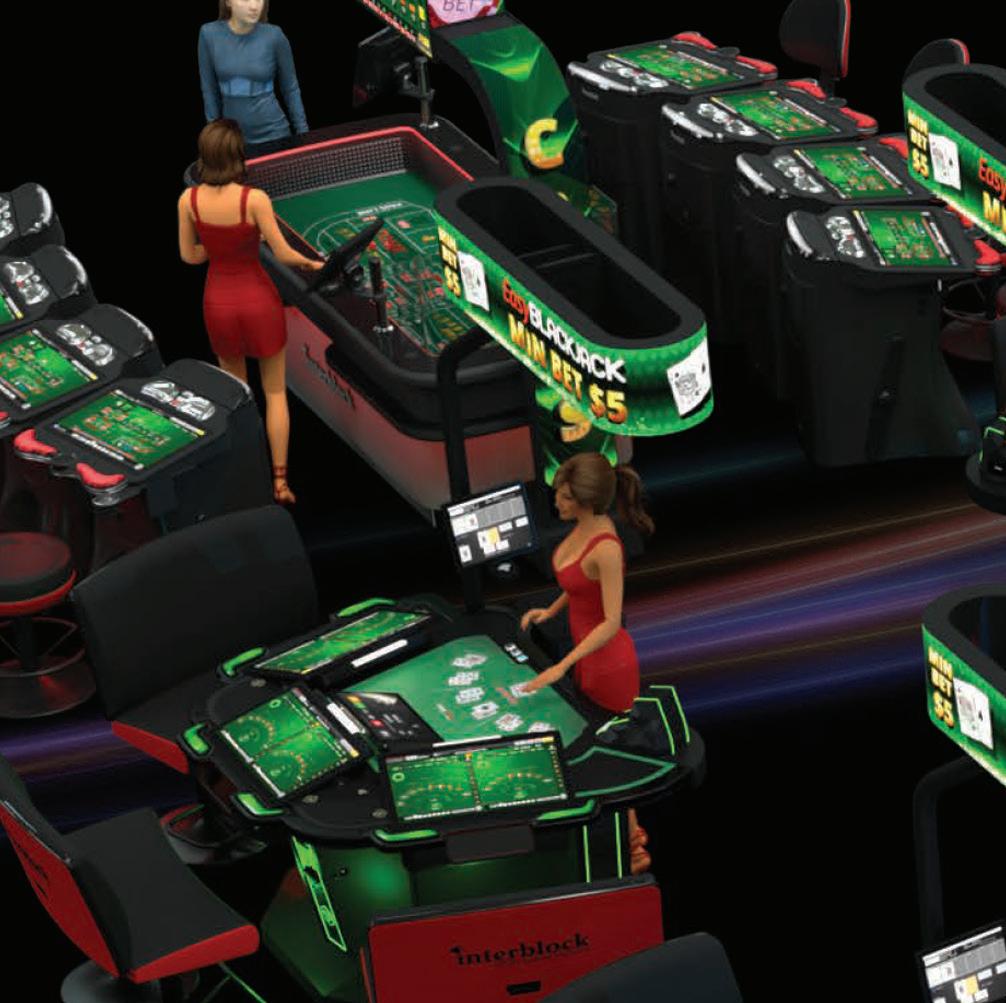
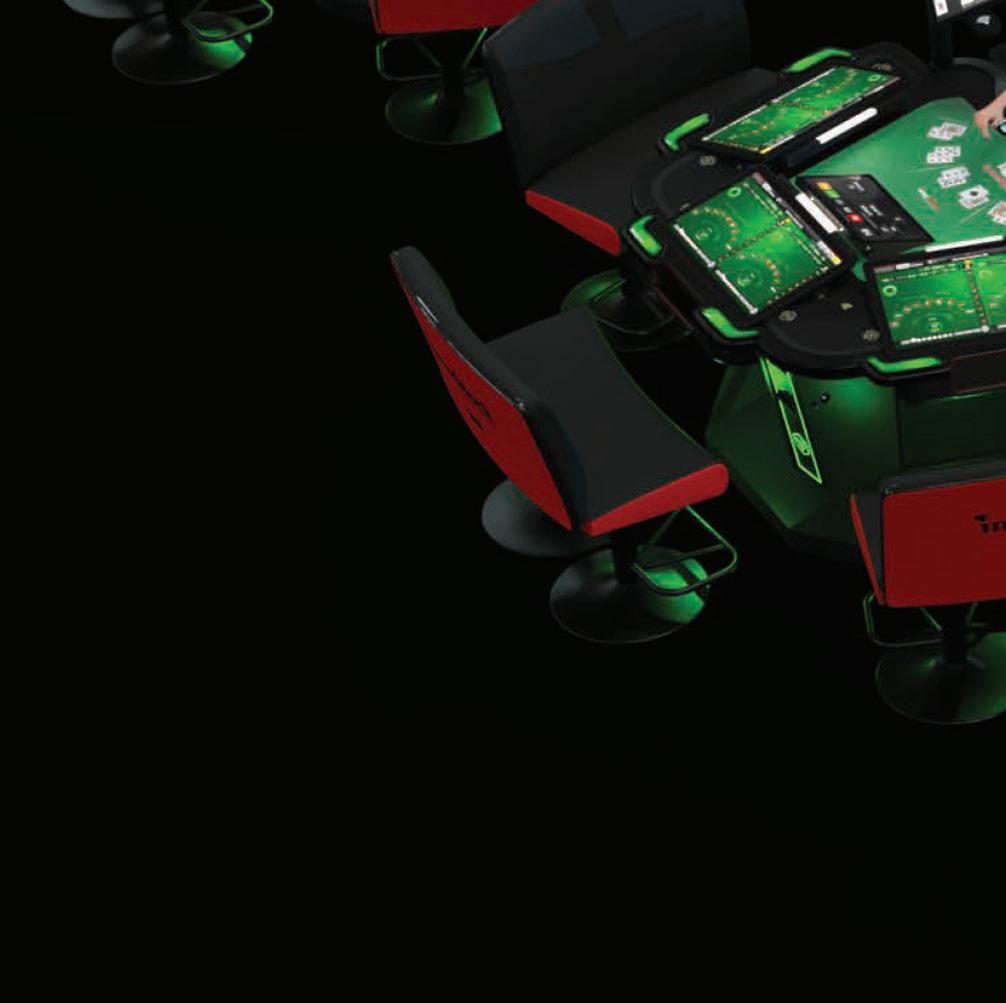
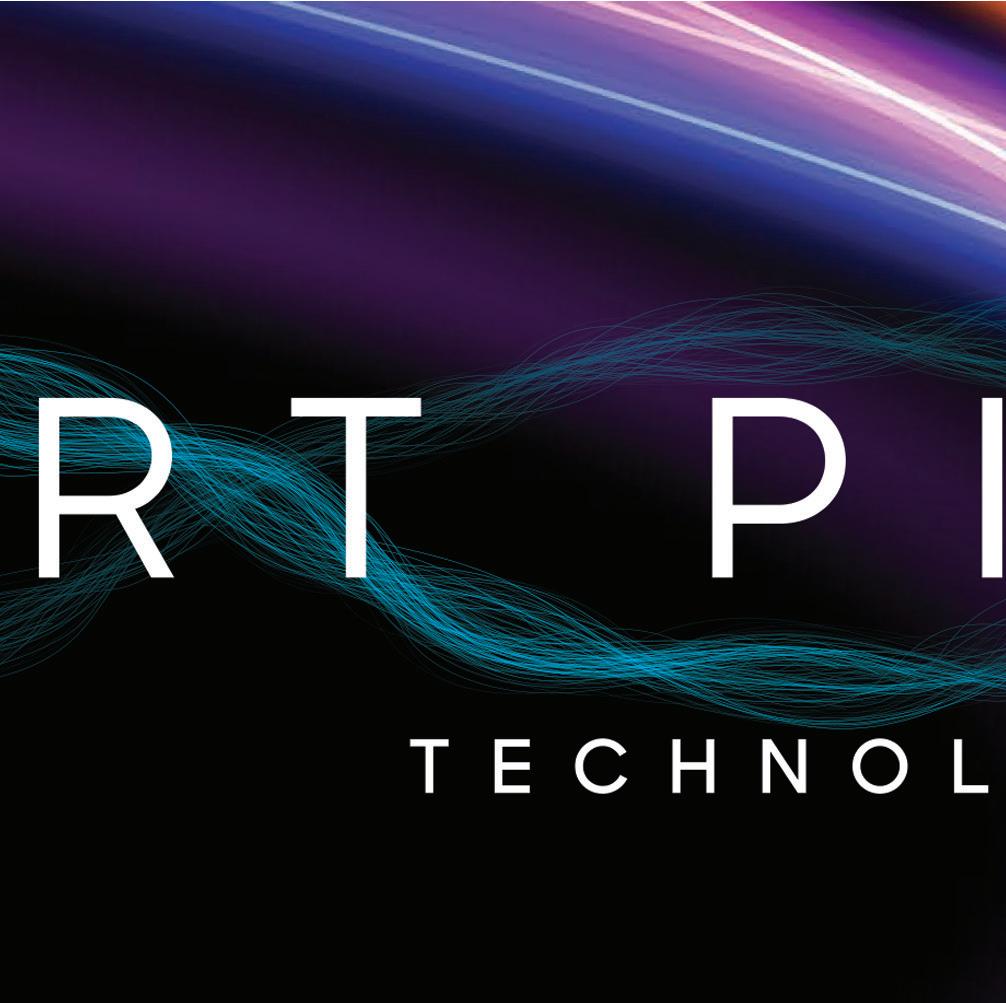











Coming off the Asia-Pacific event in Manila, Gaming America breaks down US companies honored and provides insight into October's Americas ceremony.
With the legal status of prediction markets and sweepstakes still in question, Gaming America shows where these discussions are most prevalent.
Gaming America previews the OIGA conference set to be held in Oklahoma City from July 14-16.
Having traveled to Fort Lauderdale, Florida for the SBC Summit event in May, Gaming America’s Kirk Geller recounts the most noteworthy topics discussed.
David Forman, VP of Research, continues the American Gaming Association’s series of Gaming America contributions, discussing what new data reveals.
ROGA Executive Director Dr. Jennifer Shatley shares her insight on shifting from a problem-focused mindset to strategies built more around the player.
Safer Gambling Strategies Founder & President Keith Whyte shares his views on the current state of responsible gambling.
Daniel Umfleet, Director of the Kindbridge Research Institute, discusses financial stability and responsible gambling initiatives.
Gila River Hotels & Casinos CIO Robin Villareal shares her views on AI integration and takeaways from the IGA conference in March/April.
28
We speak with the new President and CEO of DRA and Q Casino & Resort, Anthony Williams


















30
Gaming America’s Kirk Geller shares the story of Ainsworth Game Technology and the growth witnessed over the supplier’s 30-year history.

42
With the gaming industry constantly evolving, executives from Interblock, Eclipse, Gaming Arts, Galaxy Gaming and IGT speak on the new demands brought forth by consumers.
50

55
Hugo Baungartner of Esportes Gaming Brasil explains the differing opportunities for operators.
56
Fernando Garita, Betsul CEO, goes over different techniques for commercialization in LatAm, as well as the importance of localizing these strategies.
60
As LatAm gaming continues to expand, influencers hold power. Some have made headlines for the wrong reasons, though...
Lawyer Tomás Enrique García Botta takes Gaming America through the regulatory battles in Argentina and the role of influencers across the black market.
62
Alfredo Lazcano and Andrea Avedillo of the Lazcano Sámano law firm discuss recent intentions from the Mexican Government to alter gaming's legal framework.
LatAm iGaming Consultant Elvis Lourenço speaks on the consequences new legislation in Brazil could have on sports betting.
64
Gaming America surveys the latest gaming innovations, including those from Eclipse, Everi and American Gaming Systems (AGS).












Coming off the Global Gaming Awards Asia-Pacific event in Manila, Gaming America breaks down the US companies honored on the day, and looks into the Americas ceremony approaching in Las Vegas.
During the Global Gaming Awards Asia-Pacific presentation ceremony at the SiGMA Asia Summit in Manila, many notable companies took home the most prestigious Awards in the gaming industry. The Asia-Pacific ceremony consistently recognizes and rewards the strongest performers from the region's gaming industry across the previous 12 months.
Throughout the 2025 event, however, companies with a strong presence within the US market garnered recognition as well. Suppliers such as Aristocrat, International Game Technology (IGT) and Light & Wonder were all present during the luncheon ceremony, creating incredible competition for Awards like Casino Supplier and Casino Product of the Year.
“It’s no secret that some of the key players in the US gaming industry, both on the operator and the supplier side, have found significant success in the Asian region,
particularly in markets like Macau and Singapore. If you look at the Shortlist for the Global Gaming Awards Asia-Pacific 2025, you will of course see the likes of MGM Resorts, Sands, Wynn Resorts, Aristocrat Gaming, Light & Wonder, Aruze Gaming Global, Konami and IGT,” Global Gaming Awards Event Manager Mariya Savova said.
“All these companies continue to innovate and invest in creating exceptional customer experiences. In addition, they know how to tweak their offering for people across APAC and for the US & LatAm audiences; so it is natural that we will see a lot, if not all, of these companies recognized in some way at both the Global Gaming Awards Asia-Pacific and Americas.”
Light & Wonder found itself taking home the Casino Supplier of the Year honor, celebrating numerous accomplishments in the first half of 2025 and latter stages of the prior year. Aristocrat represented an
extremely close runner-up for the category, while IGT came third for its efforts in the previous 12 months.
Throughout the period, Light & Wonder debuted its latest triple feature game, Dragon Trio, along with Jin Ji Bao Xi Deluxe, which is based on Jin Ji Bao Xi titles Echo Fortunes and Endless Treasure. Additionally, Big Hot Flaming Pots, with two game titles Delicious Delights and Tasty Treasures, also made its debut in the Asia-Pacific region for the casino supplier.
In December 2024, the supplier debuted its Squid Game slot machine at Mohegan Sun in Connecticut, following the launch with its official entry into the Brazilian market at the start of 2025. Light & Wonder also made key personnel changes early in the new year, appointing Simon Johnson as its new iGaming CEO and Nathan Drane as the supplier’s next CPO in January and February, respectively.
While new expansion was discovered for the Global Gaming Awards Asia-Pacific Casino Supplier of the Year, Light & Wonder additionally formed key partnerships with well-known operators. On January 16, Light & Wonder announced a new partnership with Penn Entertainment for launches across the state of Michigan, as well as with BetMGM to release its Wizard of Oz online slot game. Perhaps its biggest highlight of 2025 so far, however, is Light & Wonder’s acquisition of Grover Gaming’s charitable gaming assets in February for $850m and officially closed during the second quarter.
For the Casino Product of the Year category, Aristocrat would not be denied a second time, coming up on stage to receive one of the most prestigious Awards in all of gaming. Celebrating its Big Fu Cash Bats product, Aristocrat continued to make waves throughout the industry in the previous 12 months, having been recognized once again by the Awards. Most recently, Aristocrat launched its portrait-format cabinet for casino floors, The Baron Portrait, which builds on the hardware design introduced with The Baron Upright in 2024.
“Congratulations to Aristocrat Gaming and Light & Wonder – two powerhouses in the global gaming industry, on their well-deserved wins at the Global Gaming Awards Asia-Pacific in Manila. Both companies have consistently delivered topnotch player experiences and cutting-edge technology that continue to elevate industry standards across APAC and beyond,” Savova said. “We look forward to seeing even greater accomplishments from both companies in the months to come and we certainly can’t wait to see what new products they have lined up for G2E in October!”
While not made official at the time of writing, Aristocrat could be taking part in the most significant transaction the gaming supplier industry has seen in quite some time, as the company is rumored to be involved in the acquisition of Interblock. The deal’s worth may fall between $1bn$1.3bn, with a formal announcement yet to surface.
Following a fantastic fourth edition of the Global Gaming Awards Asia-Pacific in Manila, the Awards will be returning for the 12th time to the gaming capital of the Americas during the Global Gaming Expo (G2E) event in October. Indeed, the Global Gaming Awards Americas are the most prestigious and trusted Awards in the industry and have gained respect amongst industry heavyweights, due to the strict rules and procedures put in place.
Ahead of the 2025 ceremony, the Americas ceremony has introduced new categories to continue shining a light on the growing markets and verticals within gaming. In Las Vegas, the Global Gaming Awards Americas will now honor the Casino Services Supplier of the Year, handed to the company which outperforms even the highest of expectations over the previous 12 months. The Awards have also divided the well-known Land-based Supplier of the Year category into both Class II and Class III awards, ensuring all levels of the Landbased gaming industry are honored each year. With significant growth seen over the past several months in LatAm, too, the Global Gaming Awards Americas will now be presenting the LatAm & Carribean Operator of the Year Award.
With the nomination window for the Americas Awards having closed on May 8, operators, suppliers and anyone involved with gaming now await the full shortlist to be revealed on September 8. Prior to then, the Shortlist will be finalized


in August, with a panel of over 100 C-level executives deciding the winners and KPMG US independently adjudicating the voting process to ensure full transparency and fairness. At the start of September, the Judging Panel will be asked to cast their votes for a winner and a runnerup across all categories; Judges will be excluded from voting in categories where they have a conflict of interest.
“The industry responded so well to our updated list of categories for the Global Gaming Awards Americas, so I am particularly excited about this year’s event in Las Vegas. The past 12 months represented yet another year of growth for the industry across the US & LatAm so the Judging Panel will certainly have a very difficult task choosing who to cast their votes for,” Savova added.
“Another exciting update is that I will be joined on stage in Las Vegas by KPMG US’ Gaming Leader, Rick Arpin, who will announce this year’s winners. Rick is one of the leading experts and consultants in the industry, and I am very much looking forward to hosting the Awards alongside him.”






















At G2E, the vast majority of the gaming industry comes together to share insight and provide a look into what the future will hold for the space, but it’s also a time to celebrate those who managed to outperform even the highest of expectations. As always, having the ability to honor those in the industry during G2E brings a unique opportunity to bring many of the highest-ranking executives together for this incredible affair – all in one room.
The Venetian Resort Las Vegas offers a wonderful space for these executives to come together, as well as for Gaming America to honor the very best performers of the previous 12 months. No matter the year, the Venetian Resort Las Vegas is filled with excitement and anticipation due to not only the presence of numerous high-ranking executives, but the eagerness of watching as the Global Gaming Awards Americas celebrates the vast growth of the gaming industry.
With the legal status of prediction markets and sweepstakes still in question midway through 2025, Gaming America shares insight as to where these discussions are most prevalent.
On April 8, US District Court Judge Andrew Gordon granted, in part, Kalshi’s motion for a temporary restraining order and preliminary injunction against the Nevada Gaming Control Commission and allowed the operator to continue offering sports event contracts to residents. Judge Gordon also denied the Commission’s counterclaims, which sought an immediate temporary restraining order and preliminary injunction that would have prohibited Kalshi from conducting business within the state. A written ruling with more detail is still scheduled to follow, but Kalshi has now been granted permission to conduct business while the case remains in litigation.



At the Indian Gaming Association conference in San Diego, California on March 31, CNIGA

Chairman James Siva and Soboba Band of Luiseño Indians Chairman Isaiah Vivanco spoke on how sweepstakes casinos and prediction markets have become the greatest threat to Tribal gaming. Siva directly pointed out how CNIGA plans to bring together numerous Tribal and gaming organizations to fight back against the legislation, which could possibly include lawsuits filed against operators that attempt to conduct these gaming operations within the state.

The Arizona Department of Gaming issued cease-and-desist letters to multiple unlicensed operators conducting business within the state, including ARB Gaming, Epic Hunts, Generiz, ProphetX, MyBookie and BetUS. The operators were allegedly providing access to various illegal online gaming services according to the ADG, such as slot-style casino games, sweepstakes, event wagering, horse race betting and peer-topeer wagering exchanges.The letters, having been distributed on April 18, claimed the operators were in violation of multiple Arizona gaming laws, including the illegal promotion of gambling, control of an enterprise and money laundering.

Michigan Gaming Control Board Executive Director Henry Williams submitted a letter to Commodity and Futures Trading Commission
Acting Chair Caroline Pham on April 29, detailing how sports events contracts can be defined as financial positions based on the outcome of a sports event, and should therefore be subject to the state’s Lawful Sports Betting Act. In the eyes of the Board, operators offering contracts such as these are circumventing Michigan law, as any and all forms of sports betting must be subject to the Lawful Sports Betting Act.
On March 19, the New York Senate Racing, Gaming and Wagering unanimously passed bill S5935, which would officially prohibit sweepstakes operations within the Empire State. Having been originally introduced by Senator Joseph Addabbo, the legislation would ban online sweepstakes games and revenue from illegal markets, while also enforcing penalties and provisions for operators that do not comply. Bill S5935 moved to the New York Senate floor, but has not been scheduled for hearing at the time of writing.
The Connecticut Office of Legislative Research and Office of Fiscal Analysis reviewed Senate Bill 1235, which passed through the Committee on Judiciary with a 37-0 vote and would ban sweepstakes casinos operating within the state. The bill stipulates punitive action for any operator offering forms of sweepstakes gaming can range from a class A misdemeanor to a class D felony. A summary of the bill describes the measure as “an act concerning the Department of Consumer Protection’s recommendations regarding lottery and gaming regulation.” Governor Ned Lamont signed this bill into law on June 11.




On April 29, the Louisiana Senate approved bill 181 in a 39-0 vote, which would ban sweepstakes gambling and penalize operators, affiliates, suppliers, influencers and investors partaking in the offering. If signed into law, Louisiana SB 181 would have gone into effect on August 1, including proposed penalties that feature fines of up to $100,000 per occurrence and prison terms of up to five years. The Social and Promotional Games Association voiced its opposition to the legislation on April 7... and Governor Jeff Landry ultimately vetoed the bill.

The NJ Department of Gaming Enforcement sent cease-and-desist letters to Kalshi and Robinhood on March 28, claiming both companies were offering “unauthorized sports wagering” to New Jersey residents, including event contracts. On April 28, however, the New Jersey District Court granted a temporary restraining order and preliminary injunction in Kalshi’s favor against the Division of Gaming Enforcement, preventing the Department or the New Jersey Casino Control Commission from “pursuing civil or criminal enforcement actions against Kalshi concerning its sports-related event contracts.”
The Illinois Gaming Board began investigating Kalshi over alleged unlicensed sports wagering and for operating outside the state’s legal framework on April 3. This followed cease-and-desist letters being sent to Kalshi, Robinhood and Crypto.com dated for April 1, claiming those operators were conducting business illegally, including offering sports-event outcome contracts without a sports betting license. The Board also added that failure to comply with the order may result in civil or criminal penalties for said operators.



Gaming America previews the OIGA conference set for Oklahoma City from July 14-16, where many of Indian gaming’s most prominent figures will be in attendance.
Having recently visited the Indian Gaming Association (IGA) conference in San Diego, California during April 2025, Gaming America bears insight into the upcoming Oklahoma Indian Gaming Association (OIGA) event taking place from July 14-16. Described as the “biggest little show” in Indian gaming, the conference will assuredly provide significant discussion when it comes to the biggest challenges facing the industry today, whether it be daily fantasy sports (DFS), prediction markets, events contracts or the use of AI.



“making their entire identity about fighting against sovereignty,” Rocha praised DraftKings and FanDuel for their efforts in ensuring all parties find success before approaching any agreement with Tribes.
During the IGA conference in San Diego as well, California Nations Indian Gaming Association (CNIGA) Chairman James Siva touched on the current threats challenging Indian gaming on a panel that additionally included Soboba Band of Luiseño Indians Chairman Isaiah Vivanco.
gaming to survive, do you?’ And we’re not afraid to really challenge these threats and ensure they don’t take a greater effect in Tribal communities.”
The gaming types were prevalent throughout IGA during its run at the San Diego Convention Center, beginning when Conference Chairman Victor Rocha spoke during an opening panel alongside DraftKings Co-Founder and CEO Jason Robins and FanDuel President Christian Genetski. Calling out operators such as BetMGM and PrizePicks directly for
“Over the course of California’s history of gaming, especially in Tribal areas, there have been countless threats to the sanctity of gaming, most recently being DFS 2.0 or sweepstakes, but no matter what California remains as the birthplace of Tribal gaming,” Siva said.
“We ended up looking at these operators and saying ‘we don’t need
Siva directly pointed out recent efforts made by the CFTC in prediction markets, and how CNIGA brought together numerous Tribal and gaming organizations to fight back against the legislation. According to Siva, he had to give himself and these organizations a “crash course” in prediction markets, and how nearly every Tribal regulator agrees this represents the greatest threat to Tribal gaming today.
OIGA Chairman Matthew Morgan, also a member of the Chickasaw Nation, spoke with Gaming America during the IGA conference on what attendees can expect from the Oklahoma event, coming off what could be described as a tense atmosphere in Southern California.
“It’s where we get a lot of people that



are in the gaming industry to come to Oklahoma and enjoy our hospitality. We’ll be in Oklahoma City again this year, July 14-16 at the Oklahoma City Convention Center. It’s led by Mayor David Holt, who actually is an Osage Tribal citizen, so he has a really good grasp on what we do and the benefits of the community,” Morgan said.
“We’ll have a strong educational session program where we will look at not only what is affecting our Tribal members in terms of the new federal administration, but also at the state level. Sports betting is going to take up a lot of our conversation space while also just looking at new innovations in our industry in general. There are new things out there we’re seeing through social media with the push for influences and marketing, and how are you distinguishing your property from your neighbor.”

With events such as IGA in the rearview now, the OIGA conference in July will serve as a necessary space for discussions surrounding these challenges to be had, whether by regulators, Tribal government bodies or the operators offering these gaming types. The desire for expansion, especially in Tribal gaming, is an everpresent that will assuredly make its way to the Oklahoma City Convention Center, given that nearly 3,000 vendors, attendees and guest speakers are expected to be in attendance for this year’s show. Morgan is no stranger to the wishes of operators and suppliers who conduct business with Tribes, keeping in mind the risks and rewards of growing such a vital industry.
“That’s something we’re always going to see, especially in our industry being such a technology and entertainmentdriven space. You’re always having people, like I say, push the envelope.
In a way, that can be helpful because it helps our industry grow while being mindful of what impact it has on communities. If someone's doing something unsavory, a bad apple, we know the consequences to be suffered and can push back from that,” Morgan said.
“Tribes are very leery in what they decide and I think a lot of that goes back to why we’re empowered in the first place to operate gaming operations within Indian Country. It was a way to have economic development for our Tribes, give back to programs and services, and have that relationship with Tribal government officials. A lot of our regulatory bodies are made up by individual Tribal members and it’s not just a job for them.”
As Gaming America prepares to join the Indian gaming industry’s most influential figures at OIGA from July 14-16, it cannot be ignored how crucial 2025 appears for Tribes and its businesses. Even outside of the worries currently being felt by Tribal members such as Rocha, Siva and Morgan, the exponential growth Indian gaming could see during the course of this year may alter the direction the industry heads for the foreseeable future. Whether it is iGaming, sports betting or battling operators of DFS and prediction markets, there is no telling the size Indian gaming could grow to by the conclusion of 2025.
From California to Oklahoma, Tribes are looking for different ways to grab hold of the opportunities constantly presenting themselves within the gaming industry, while remaining true to the beliefs and sovereignty from which it originated. Despite certain challenges being presented year-in and year-out, new offerings that threaten Tribes could easily be seen as business opportunities if an interest within the community starts to grow. Beginning with the IGA conference in San Diego and extending to OIGA in Oklahoma City, these events are the first step to breaking new ground in Tribal gaming – and ensuring future generations will carry on the legacy of this industry.






Having traveled to Fort Lauderdale, Florida for the SBC Summit Americas in May, Gaming America’s Kirk Geller recounts the most noteworthy topics discussed at the conference.
Transitioning away from New Jersey to the warmer climates of Fort Lauderdale for the first time, the SBC Summit Americas provided an increased look at the growth seen among LatAm markets and the polarizing state of prediction markets and sweepstakes. By way of various panels featuring executives from some of the most prominent companies in gaming, there was no shortage of expertise offered throughout the two-day conference.
Beginning on May 14, speakers such as Vixio Chief Analyst James Kilsby, Genius Sports VP of Brazil Guilherme Buso and Amusnet Brazil
Manager Marco Pequeno touched on what companies looking to conduct business in the newly regulated Brazil market should expect for the remainder of 2025. Despite these past four months going by in what felt like “four minutes,” many applications have been passed since January 1 2025, when the country’s iGaming market officially went live under new regulations.
Operators with an interest in expanding their services to Brazil, especially those looking to partner with professional sports teams, had to “start from zero” due to legal challenges faced in the early going of 2025, building a “new marketing strategy” to find a presence within the
country. The speakers made sure to properly warn foreign companies that Brazil is a “different animal,” and how extending olive branches such as contacting a local specialist could be the best way of entering the iGaming or sports betting market. “We do notice, since January, the game has changed. We’ve noticed how some practices needed to be altered, especially in sports betting. Prior to 2025, sports betting was something that was just expected, but the knowledge of bettors and players has changed in recent times,” Buso said.
“We are looking at the changes from operators in response to the high
competition occurring in the market, and that is important because the bettor needs to trust the industry and that no ‘yellow cards’ are being thrown around in regulation. The market needs to be proactive in building a relationship with the consumers that are being targeted in these practices.”
It was estimated during the panel that there are 293 applications still awaiting approval, and “many more” are expected throughout the remainder of 2025. Kilsby was unafraid to discuss the regulatory battles ahead for Brazil, and how illegal operators have already begun to make their presence known across the country.
“We studied almost all of the international markets that are regulated in gaming. The perfect solution for combatting regulation challenges does not exist,” Kilsby said. "This is very complicated and a very big challenge still. Illegal sites are finding advantages bypassing these regulations by offering bonuses and failing to pay tax, so a war has formed to keep these operators under control. It’s a common challenge found in Europe and the US as well, so we’re set up to see a real battle for regulation in these next few months.”
Issues with legality have also extended outside of the iGaming forms of gambling in Brazil, as concerns surrounding match-fixing and suspicious betting patterns have made themselves known in the past few months. In a new effort to strengthen the integrity of sports, however, the Brazilian Ministries
of Sport and of Finance partnered with Sportradar on May 16 to launch specialized training focused on combating these threats to regulated forms of wagering.
Despite partnerships such as these, the Public Prosecutor’s Office of Rio Grande do Sul launched an investigation into Juventude footballer Ênio over suspicions of deliberate match-fixing on May 20, helping to exemplify how these issues have remained prevalent. Notably, the SBC Summit Americas in Florida made it clear that not only Brazil, but LatAm and its gaming industry as whole, would be a main focus in 2025 and beyond for the conference, as many of the panels featured Spanish or Portuguese speakers with live translation. With an entire section of the expo hall dedicated to LatAm gaming topics as well as the move to Florida, it would not come as a surprise if 2025 was just the beginning of LatAm markets being showcased on a grander scale.
Covering topics for iGaming in North America, executives from Resorts Digital, BetMGM Canada and High Roller spoke on the current state of the market on May 14, including the rapid expansion seen in Canada compared to growth carried out through the US.
High Roller SVP of Corporate Strategy & Investor Relations Seth Young discussed development seen in Ontario specifically,
calling it the “most rapidly expanding market” over the past three years. The expansion has come as a surprise to Young, figuring regulations have been written by those “who may not understand the industry fully.”
Speaking on the future of verticals such as sweepstakes and prediction markets, Resorts Digital Gaming CEO Ed Andrewes believes states will “catch up” to the gaming types, and begin introducing legislation to properly regulate or ban operators conducting business. “If the assumption is that they will eventually regulate, you have to ask yourself how long will that take? I think sweepstakes will become regulated at some point, but I would never be able to give you an estimation as to when that would be,” Andrewes said. “In the past nine years, I have been continuously attempting to grab hold of an understanding for these new gaming types and how they would be regulated, but it’s difficult because of how each state has chosen to operate.”
Canadian Gaming Association President & CEO Paul Burns touched on how unregulated gaming has been around for 25 years, meaning sweepstakes “fails to stand out” despite the attention given to the vertical throughout 2025. Burns also said regulators need to adapt quicker with the constant threats of illegal operators looking to bypass regulation, having said, “You’ve chosen to do this, you’ve chosen to bring
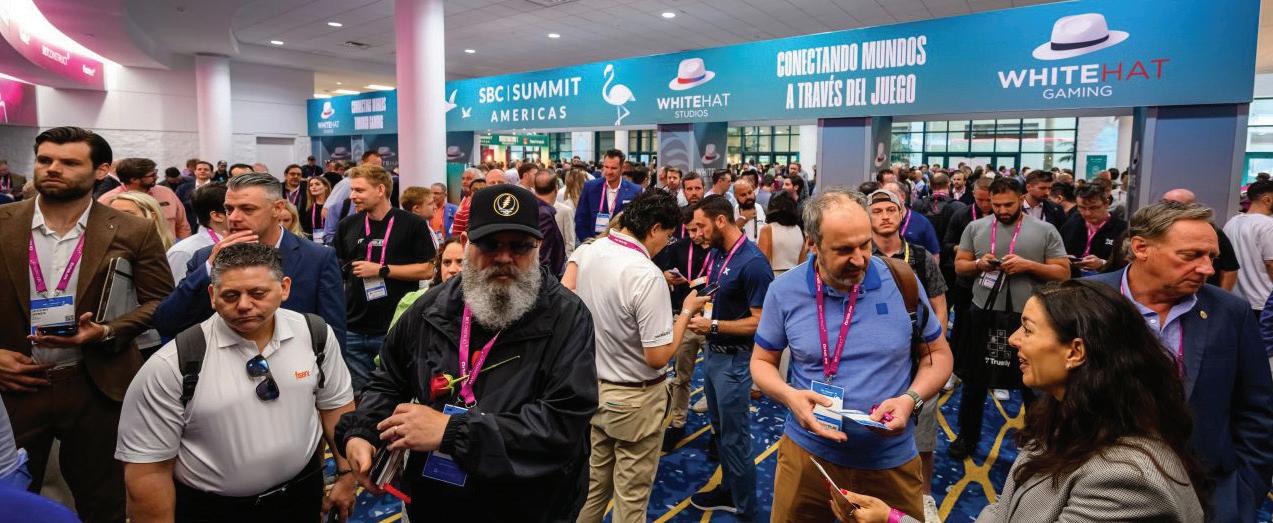
this offering to players and residents and now you need to protect them.”
Calling the vertical a “very interesting” opportunity for the US, Young stressed that proper regulation would need to be set into place, but Adams had little issue suggesting prediction markets could be an offering BetMGM explores in the future, especially with how “exciting” Young made the opportunity appear during the panel.
Prediction markets certainly took hold of everyone’s attention during the SBC Summit, with an entire panel having been assigned to the topic. It featured Sporttrade Founder & CEO Alex Kane, Jones Day Counsel David Aron and Wallach Legal Founder Daniel Wallach. The gaming type has not grown without controversy over the course of 2025, as regulators such as the Michigan Gaming Control Board (MGCB) began initiating investigations into unlicensed sports predictions markets operating throughout the state.
Michigan’s investigations align with similar actions already taken by other state
regulatory bodies, such as Nevada, New Jersey, Connecticut and Ohio, while focusing on how this form of unlicensed offering may jeopardize the integrity of the state’s legal sports betting system.
“We take consumer protection very seriously and are committed to ensuring Michigan residents are engaging with safe and legal sports betting options,” MGCB Executive Director Henry Williams said. “Unlicensed entities not only pose a risk to consumers but also undercut the integrity and revenue-generating potential of the state’s regulated sports betting industry. We are actively investigating these practices and will pursue appropriate measures to protect Michigan bettors.”
The concern over proper regulation has not stopped operators such as Flutter or Kane’s Sporttrade from expressing interest in developing prediction market operations, as CEO Peter Jackson confirmed Flutter is monitoring the development of such activity during a Q1 2025 earnings call on May 9. Kane argued that Sporttrade has already been in the prediction market business for quite some time, saying the operator sent a
letter to the Commodities Futures Trading Commission (CFTC) to apply for no action relief.
The panel seemed to have been affected by the Florida heat when Wallach became quite passionate in his argument as to why these markets should still be deemed illegal. Wallach went on to state there is “no congressional authorization” for sports event contracts, and that regulators and operators need to “take a step back” and realize why legislation such as PASPA specifically highlighted these offerings as illegal.
“At best what Kalshi is doing today is gaslighting. At worst they are committing a fraud on the courts by saying congress would allow this,” Wallach said. “Now, nine months later, they are denying all of these things. They’ve run up a two-court winning streak because I don’t believe attorney generals are properly fighting back against these offerings. If these things are bets or wagers, Kalshi will eventually lose the battle in the third circuit or somewhere down the road.”
Aron referred to the CFTC raising concerns about a potential deal with the

National Football League (NFL) where sports contracts could be exchanged, believing it would be “anti-competitive” to allow sportsbook operators to exchange sports contracts on the open market.
“There was no guidance Congress ever gave the CFTC to accurately describe the operation of these offerings, and therefore the CFTC never went along with approving these deals with the NFL,” Aron said.
“There was also no proper description of how these contracts could affect the public from a gambling or commercial standpoint.”
Kane shared his belief that people follow what legal representatives such as Wallach and Aron say and see sports events contracts as a major threat, whereas what is currently being offered is “very, very, very different” than the concerns raised by regulators.
“We’re 100x off from what sports betting and sports event contracts are currently being offered. The only thing that is similar is you are risking money, and it involves sports,” Kane said. “It’s very different than if I go on DraftKings and say ‘I want this leg or that leg,’ but an exchange promotes one big juicy parlay that can be offered at

various prices due to the competition in which operator is offering the best odds.”
The conversation surrounding prediction markets would expand into the affiliate space as well at SBC Fort Lauderdale, as Catena Media CEO Manuel Stan, Vault Sports CEO Caleb Dykema and Media Troopers Business Development Officer Jonathan Sprung had the chance to speak on how their companies are adapting to the recently introduced gaming type. Sprung had no issue mentioning “prediction markets” at least 25 times throughout the 45-minute discussion, finding no shortage of opportunity to remind the audience how quickly the vertical is growing.
“Another thing that we have to mention is every time we go to a conference here, we’re talking about the next type of iGaming product. It was a sportsbook and then it was DFS and DFS 2.0, and then we’re talking sweeps. Now we’re talking about prediction markets, so it’s always shifting,” Sprung said.
“If you say, ‘hey, I’ve got this figured out,’ you are way behind and you’re missing out on what could potentially be the next big thing, which is prediction markets. Prediction markets… prediction markets.”
Dykema chose to shift the conversation towards how affiliates continue to market to consumers as the gaming industry expands so rapidly, highlighting a new focus on retaining loyal consumer bases as compared to building an engaging product from the get go.
“What we’re seeing is in terms of attacking that angle is diversifying through different channels, whether that’s a YouTube show where a player comes back day after day or week after week to see their favorite creator talk about sports, get their picks, get their analysis, that kind of thing. It’s channels like that where we’re finding they’re re-engaging and building a community of retention,” Dykema said.
While Sprung once again made his point known on how traditional advertising formats such as top lists and SEO “are not dead,” he did agree with Dykema on how engaging with influencers can be a way of
opening new retention channels, as long as the criteria fits the personality.
“You can’t say, ‘oh, I’m just going to take six different operators and try it for each influencer.’ They have to connect with that brand. Every influencer can’t go, ‘I’m going to try everything and see what works,” Sprung commented.
“They have to go, ‘I’m already talking about DFS, let me work with the DFS brand that aligns with what my followers want’ and then potentially add in one or two from there. But you’re not going to go to a casino influencer and say ‘you should really talk about blackjack’ if all they do is talk about slots. You’re not gonna pigeonhole these people and influencers are crazy people.”
When breaching the topic of influencers, Stan compared the panel speakers to “dinosaurs” trying to attract customers the same way a yellow taxi cab would in New York or a hotel reaching out to potential guests. Referring to influencers as the “Ubers” or “Air BnBs” of the affiliate industry, Stan believes these content creators are similar to the companies each speaker represents, in that all are just attempting to find ways of “providing value and monetize” consumer activity.
Throughout the SBC Summit Americas, and even dating back to the Indian Gaming Association (IGA) conference in San Diego which Gaming America was also able to attend, it’s been made clear there is a shift forthcoming within gaming. Whether from a regulatory space or in the iGaming scene across multiple countries, there is no shortage of opportunity and possible risk, presenting itself to operators, affiliates and suppliers alike.
Getting the chance to sit in on discussions with the executives directly involved with these new avenues of growth help to showcase how even top-level voices struggle to understand the complexity of verticals offered between iGaming and sports betting. In a space that has increasingly become “learn as you go,” there is no telling the pace at which companies will hedge potential risk to create enhanced revenue sources.
David Forman , VP of Research, continues the American Gaming Association’s series of Gaming America contributions. What does new data reveal about US gaming?
Annually, the American Gaming Association (AGA) publishes research that offers a comprehensive view of the US gaming industry’s performance and trajectory.
This year’s research overwhelmingly reveals an industry coming off an explosive half decade of expansion, prepared to adapt to consumer behaviors amidst a potential period of economic uncertainty in the years ahead.
The AGA annually releases its Sports Betting Advertising Trends report. This year’s report highlights a continued decline in sports betting advertising, which fell 9% in 2024 and is down 27% overall since 2021.
Television sports betting ad volume declined even more – down 17% in 2024 and 44% since 2021. Sports betting comprised just 0.4% of total TV ads in 2024. To put this in further context, alcohol advertising comprises 0.5% of total TV ads and pharmaceuticals stand at 13.6% of total TV ad volume.
The decline isn’t unexpected. As legal sports betting markets mature, it’s clear operators will continue to optimize their marketing investments. Nonetheless, it’s important to remember that legal advertising remains vital for steering consumers away from unregulated offshore operators, many of whom are unaware they’re even using illegal platforms.
The AGA’s spring 2025 Industry Outlook offers insights into the current and future
economic health of the gaming industry based on executive sentiment, RFP activity at casino hotels, gaming revenue, and other economic indicators.
In Q1 2025, real economic activity in the gaming sector contracted compared to the year prior at the fastest rate since the Covid-19 pandemic. And for the first time since we began surveying executives in 2021, more leaders expressed a negative view on current business conditions than a positive one. This shift reflects rising uncertainty around broader economic trends, which many executives cited as limiting operations.
The AGA also recently released our annual State of the States report. State of the States is our definitive look at the year that was in commercial gaming. The report includes a state-by-state look at the industry’s financial









performance and the major gaming policy discussions impacting our industry. It also features a wealth of charts breaking down what’s legal where, how many, and what kind of gaming locations are available in each state, and more.
US commercial gaming revenue hit a record $18.87bn for Q1 2025, marking the 17th straight quarter of growth. Traditional casino gaming generated $12.46bn, a 1% year-over-year increase. Online segments saw sharper gains – iGaming jumped 27.3% to $2.52bn, while sports betting climbed 13.6% to $3.87bn. Online gaming now makes up 32.8% of total revenue, reflecting the industry’s digital shift. State and local governments benefited too, collecting $4.25bn in taxes, up 10.6% from Q1 2024.





















































































DAVID FORMAN VP of Research American Gaming Association
For the past few years, it has felt like everything in gaming was “up and to the right,” but as the rapid expansion into new markets slows and the pandemic-related shifts in consumer behavior become the new baseline, understanding what’s going on and why will become more important than ever. The AGA’s research will continue to look at the industry from all angles – from C-suite sentiment to broad trends in gaming revenue and consumer participation – and we look forward to continuing to provide data-driven insights for industry leaders, policymakers and analysts.


































Dr. Jennifer Shatley discusses how operators are shifting from a problem-focused mindset to strategies built more around the player.
Responsible gaming has come a long way since its emergence in the late 1980s. When I worked on my first responsible gaming campaign 25 years ago, the industry’s primary efforts consisted of providing players with a pamphlet if they said they had a gambling problem. Now,
thanks to decades of research and a commitment from operators to support players, we have evolved these practices substantially.
However, even today, a fundamental misunderstanding persists that responsible gaming programs are synonymous

with problem gambling programs. This misperception limits the potential impact of tools, policies and educational campaigns that could benefit all players, not just provide resources for those experiencing problem gambling. To be clear, both types of policies are important, but they are














shown that responsible gaming tools, such as pop-up messages reminding players of their monetary limits (Wohl, Stewart and Gainsbury, 2013), can help players stick to their personal limits.
Global Solutions and Kindbridge Health, developed the Know Your Play initiative for college students.











different. They have different objectives, audiences and approaches.

Problem gambling policies provide resources and support for those struggling with their gaming behavior. Responsible gaming, by contrast, is a proactive framework targeted to all players, helping empower them to make informed decisions, establish personal limits and view gaming as a form of recreation.
The distinction between “problem gambling” and “responsible gaming” is more than just semantics – it shapes the entire approach to policy and practice. When we view responsible gaming tools, such as deposit and time limits, as exclusively for those experiencing problem gambling, we stigmatize their use.
Players may avoid these tools because they incorrectly see them as “problem gambling tools,” thereby missing out on resources that can enhance their overall gaming experience. In fact, research has








offering personalized insights that help and play behaviors. Notably, over 3.5m
To break through this barrier, we must reframe these perceptions and embed responsible gaming into the player experience. FanDuel’s MySpend and DraftKings’ My Stat Sheet products enable players to review their play activity and are excellent examples. These tools integrate seamlessly into user interfaces, offering personalized insights that help players proactively manage their budgets and play behaviors. Notably, over 3.5m players interacted with MySpend during this past year’s NFL season, far beyond traditional RG tools’ usage rate.
These tools represent a new generation of responsible gaming innovation designed with the end user in mind. They underscore a crucial shift from “problem-focused” to “player-focused.”
Still, technology alone isn’t the answer. Education remains essential, but it must be relevant, engaging and rooted in the realities of its target audience. This is why the Responsible Online Gaming Association (ROGA), in partnership with the Responsible Gambling Council, Epic

The campaign focuses on universal themes like financial literacy, mental wellbeing and healthy decision-making. By aligning responsible gaming with broader life skills, it frames responsible gaming as a positive and empowering part of the player experience. Know Your Play is just one way ROGA aims to expand responsible gaming engagement. More broadly, our mission is to show how responsible gaming tools and education can help all players keep their play within their own personal limits.
As part of our efforts, ROGA is finalizing research in partnership with the Responsible Gambling Council to identify opportunities to increase engagement with limit-setting tools amongst all players. We hope this research can serve as a stepping stone for broader opportunities to reframe responsible gaming as a core feature of the gaming experience; thereby, increasing adoption, reducing stigma and emphasizing the relevance of these programs and tools for all players.
To do so, we must change the narrative. Responsible gaming tools are not red flags for players experiencing problems. They are the seatbelts and speedometers that help support an enjoyable and sustainable player experience. To truly innovate in responsible gaming, we must treat it as a dynamic, evolving discipline. That means listening to players, measuring realworld behavior and adjusting strategies accordingly.
Whether through novel responsible gaming tools, new research on better engaging players or education to reduce stigma, ROGA members constantly seek ways to drive responsible gaming innovation. We’ll continue to push forward in finding ways to meet customers where they are and deliver tools that help them play responsibly.
DR. JENNIFER SHATLEY Executive Director ROGA
Innovation in responsible gaming isn’t about doing more; it’s about doing better. And when done right, it benefits everyone.















Whyte shares his views on the current state of responsible gambling and how operators can begin implementing advanced practices.
After decades of tireless advocacy, grassroots organizing and research from recovery-focused organizations, the US gambling market may finally be on the verge of a responsible gambling (RG) revolution. What was once a relatively quiet undercurrent – pushed forward by generations of people in recovery and nonprofit leaders in the problem gambling (PG) field – now feels like a tipping point. And like many revolutions, this one carries costs and benefits. But make no mistake: for
players and families, the benefits far outweigh the risks.
The gambling industry has always been an early adopter of technology. From virtual reel mapping to the first online casinos to AI-driven player profiling, operators have consistently leveraged emerging tools to maximize revenue. This pursuit of innovation, especially following the 2018 overturning of PASPA and the rapid spread of legalized online sports betting, has also heightened risks.
We’ve seen an increase not just in gambling participation and revenue, but also in the frequency and severity of gambling-related problems. Technology has made gambling faster, easier and more immersive – but also riskier, particularly for vulnerable individuals such as young, male sports bettors.
But now, that same technological energy is beginning to surge into the RG and PG spaces. The shift is both overdue and full of potential. The tools exist; what’s needed now is the will – and the investment – to revolutionize responsible gambling.
The idea of “creative disruption” is often associated with Silicon Valley start-ups, but it’s time to reframe that idea for responsible gambling. These four techenabled approaches are already reshaping the landscape:
– Once clunky and largely paper-based, enforcement-focused and jurisdictionallylimited, self-exclusion has been modernized with digital platforms that allow players to opt out of gambling across multiple operators with just a few clicks. With biometric ID verification and real-time enforcement, these tools provide more effective and user-friendly pathways for those ready to step away. Providers like IDPair are working with states, Tribes and operators to implement the National Voluntary Self Exclusion Program, removing barriers and streamlining the process.
Programs like BetBlocker allow users to block access to thousands of gambling websites and apps across devices. These tools are increasingly being integrated into operator offerings and even prescribed by clinicians as part of treatment. Making them freely accessible through public health channels would expand their reach even further.
Access to specialized gambling treatment has long been limited by geography and stigma. Telehealth has changed that. Virtual counseling platforms now allow people to receive expert help from the privacy of their homes. This is especially crucial for those in rural, frontier and underserved areas or those hesitant to walk into a clinic. Companies like Birches Health specialize in problem gambling and are covered by insurance.
New mobile apps are providing real-time support, community forums and self-monitoring tools for those in recovery. Some use AI to detect relapse triggers and prompt intervention. These are not a replacement for therapy but can be a powerful complement – and a lifeline between sessions. Apps such
as RecoverMe and Revive offer users evidence-based empowerment.
Each of these tools on its own is unlikely to be a silver bullet, but taken together they provide more layers of protection in the safety net. They supplement and strengthen, not replace, traditional selfhelp meetings (now increasingly available online as well) and in-person counseling.
Of course, no revolution is without resistance. Challenges are still abound. Scaling pilot programs into nationwide systems requires serious investment, and many innovative tools remain trapped in the early stages due to a lack of funding or outcome evaluations. Massive cutbacks in federal health funding and looming economic uncertainty will have direct and indirect impacts on both public and private support, as problem gambling programs are traditionally last, leastfunded and first-cut. Some regulators and state health agencies have hesitated to embrace tech-based solutions, driven by understandable caution. After all, we are dealing with an extremely vulnerable population, and untested interventions can do more harm than good.
But, in many cases, this caution has
























































































slowed progress to a snail’s pace. The speed of change in the commercial gambling world demands a comparable pace from those charged with protecting the public. Nonprofit organizations and treatment providers must also evolve, moving from analog models to digital-first approaches that reflect how people live and seek help today.
It’s time to bridge the innovation gap. That means investing not just in technology but in rigorous evaluation, public-private partnerships and infrastructure that supports long-term sustainability. It also means listening to people with lived experience –many of whom are leading the charge for more modern, accessible and humane systems of support.
This moment presents an opportunity to redefine the social contract around gambling in the US. We can continue to allow technology to drive risk unchecked – or we can redirect its power across what I have termed the PETERRR approach to a comprehensive public health approach to problem gambling: Prevention, education, treatment, enforcement, responsible gambling, research and recovery.
We know how to do this. The building blocks are already in place. We have examples from successful campaigns in other fields. What’s needed now is bold leadership, not just from the gambling industry, but from regulators, health agencies and tech entrepreneurs who see RG as more than a compliance requirement – as an economic and ethical imperative, a pathway to safer and sustainable gambling and a strategic advantage.
KEITH WHYTE Founder & President Safer Gambling Strategies
Positive disruption is possible. In fact, it’s already underway. The question is whether we’ll accelerate it fast enough to meet the moment – or let it slip away. For the sake of gamblers, their families, their communities and all stakeholders in the gambling industry itself, the time to act is now.






Daniel Umfleet, Director of the Kindbridge Research Institute, discusses financial stability and responsible gambling initiatives. What does gambling-related financial harm tell us?
Americans are under growing financial pressure. Nearly half of US adults say they live paycheck to paycheck, up from 40% in 2022. At the same time, the financial environment is becoming faster, more fragmented and more psychologically demanding. Spending happens in seconds through apps, touchless payments and digital wallets. Ads, influencers, and platforms are constantly nudging people to buy now and think later. Even everyday platforms like food delivery apps or streaming services are built around microtransactions and upsells.
At the same time, gambling is increasingly woven into the fabric of everyday digital
life. Sports betting, once confined to casinos or sportsbooks, is now just another app on your phone – accessible 24/7, promoted across social media, and often framed as a normal part of watching a game. Yet while gambling has expanded, financial education hasn’t kept pace. Just 57% of US adults are considered financially literate, meaning nearly half of the population may struggle to understand basic financial concepts like interest, risk and budgeting. That gap leaves many people vulnerable to harm and increases the likelihood that they’ll engage in risky financial behaviors without fully grasping the potential consequences. As the lines blur between entertainment finance,
and risk, gambling operators are now at the center of a rapidly evolving consumer landscape – one that demands new forms of accountability and care.
For many who experience gamblingrelated financial harm, gambling is not the root issue. It’s a visible symptom of deeper stress beneath the surface. In clinical settings, many who seek help for gambling later learn that they’ve been dealing with untreated mental health challenges like depression, trauma or anxiety. The consequences of coping with deeper challenges through gambling can be severe: people fall behind on rent, drain savings or use credit to fund bets.


The risk of gambling-related financial harms is especially high for those facing systemic challenges, including young people with limited financial literacy, veterans and service members coping with stress, and low-income households using gambling to make ends meet.
Gambling-related financial harm is often the “canary in the coal mine,” but we don’t currently treat it that way. As with other public health issues, early signs like excessive borrowing, risky financial behavior and mounting stress often go unnoticed. The warning signs – overdrafts linked to gambling, recurring payday loans, repeated cash advances – are often visible to banks and lenders, yet without shared frameworks, they go unrecognized. At the same time, healthcare providers may treat the mental health symptoms without ever seeing the financial picture. Prevention starts with understanding, not blame. And it requires coordination across sectors.
That’s the aim of the Financial Stability and Responsible Gambling Initiative, a new national effort led by Kindbridge Research Institute and UCLA. For the first time, leaders from finance, healthcare, research and advocacy are coming together to examine where gambling and financial



instability intersect – and how to intervene earlier, more effectively and more equitably. It reflects a public health approach: one focused on root causes, early intervention and smarter systems of support. By drawing on diverse expertise, the initiative will generate research-informed strategies that help prevent harm, support recovery, and guide meaningful policy and practice. Until now, conversations about gambling







harm and financial health have happened in silos. This initiative bridges those gaps, bringing together disciplines that haven’t traditionally worked in partnership, but must.
For the gambling industry, this is a moment of opportunity. As betting becomes more closely tied to financial systems – through credit cards, digital wallets and embedded fintech – there’s a growing responsibility to help protect financial wellbeing. That could mean investing in affordability checks, supporting data-sharing frameworks, or co-developing interventions with public health experts. Financial harm is a real and rising risk. Addressing it proactively isn’t just the right thing to do – it’s also essential to long-term trust, innovation and sustainability.
DANIEL UMFLEET Founder & CEO Kindbridge Research Institute
Financial stress in American households continues to mount, but we don’t have to wait until their gambling spend becomes so noticeably incompatible with wealth building goals or general financial management practices. With collaborative, forward-thinking action, we can protect people’s financial health before widespread damage is done. Let’s treat this issue with the seriousness it deserves –and the shared responsibility it requires.










Gila River Hotels & Casinos Chief Information Officer Robin Villareal speaks with Gaming America on AI integration, her takeaways from IGA 2025 and her property's aims to stay a step ahead.
What are the latest digital or technological innovations Tribal operators are adapting in properties, and at Gila River specifically?
Obviously cashless was a big one, the evolution of the TITO ticket was a really major milestone in gaming not just for commercial, but also Tribal gaming. It really opened up everyone to think outside the box. Since that has happened, you look at efficiencies for departments, continuously looking for ways we can improve our employees conduct, their work, what helps them
and what are the biggest pain points. I sit with a lot of team members throughout the casino and just ask them: what would be something you’d like implemented in your daily work that would help you conduct work more efficiently?
Smart rooms for your hotel also, where you can utilize an app to open your door, use voice commands to open up the curtains, turn on the music and turn on the TV. So, looking at that aspect, I think it’s becoming more what I would call AIdriven. Even though a lot of places don’t want to consider that, it’s definitely moving in that direction.
Is it always important for Tribal gaming leaders to be open to these new opportunities, even while sovereignty and tradition remain at the forefront?
It’s business. If you’re not on the train, then you’re not going anywhere. I know some Tribes like to be status quo; I think it’s the fear of evolving and changing. Maybe, for Tribes, it’s stepping away from who they are, their culture, tradition and identity, and as more Tribes are becoming successful in the commercial world, you have to take on that corporate mentality to some effect.
For me, that’s one of the biggest things
a lot of Tribes face as an internal challenge: how do you maintain competitiveness yet still keep that identity of culture and community?
And is staying up to date with this technology something Gila River sees as a necessity to remain prominent in the Arizona market?
Absolutely. When I first got into this role, I sat with our CEO and asked him ‘what’s the expectation of me in this role?’ He told me he wants me to be innovative and put myself out there. Those two items, at the time, made my knees shake a little because, being in IT originally, you’re not someone who goes outside and puts yourself out there. The idea of meeting people was really scary, but for the innovation part of it, I was definitely super excited.
When you’re in IT, you see all the new technology, you hear about it, talk to your colleagues and you wonder how that technology will go about being implemented. If you’re not innovative, you’re not going to be successful in this day and age.
Is finding ways to be the first to market also essential in Tribal gaming?
Being first to market is a double-edged sword. It could be successful or challenging, but either way it works out in my opinion. When you’re first to market and you have a new solution, the team is doing all the troubleshooting. The team is doing everything to make integrations work or any anything of that nature. Being innovative is something that, as an organization, you’re going to experience together and push through challenges.
How do Tribal gaming operators view AI and is it more of a concern or a positive right now?
I believe right now it’s more of a concern. The hypotheticals, even the ethics behind AI, those are some of the things we should be thinking about. AI has a lot of positives, and it also has a lot of negatives. In order to utilize it, we have to understand it, trust but verify. At the end of the day, it’s important
for organizations to have policies set in place about what type of data we’re going to allow, but I think for marketing teams and the slot area, it’s a great tool to ease the lives of your workers.
Was AI a main takeaway for you from the IGA conference in San Diego in April?
From IGA, there was certainly a lot of AI and cybersecurity, but it’s also where gaming is going here in the future because of the political climate. I found a lot of Tribes are concerned about the political climate, its impact on Tribal gaming and what it’s going to do to our communities. That was definitely the temperature I got from attending the conference.
Could you also touch on concerns surrounding cloud-based gaming, as you had mentioned in a previous interview with Gaming America?
My concern is: to truly have cloud-based gaming, I would feel more comfortable having a secondary internet service provider (ISP). For us here in the community, we have our own telecom company, which is where we get all of our connections to the outside.
For me to feel confident, I would want a secondary solution so we can manufacture

the same infrastructure we would carry up in the cloud. The other part is what would be the temperature of my community and dealing with data sovereignty? At my level, that’s not something where I’m willing to say, ‘oh yeah, we’re just going to go ahead and I’m going to make that decision for the community.’
It needs to be a collaborative decision and one community entities should also buy into, so we’re all practicing the same tools more effectively.
What should guests look forward to from Gila River throughout the remainder of 2025?
Well, for 2025, I feel like we’re already into 2026, to be honest. The biggest thing I’m looking forward to is implementing and turning over a couple of suites we are putting that smart technology in. I want to showcase how it could work in our environment to our executive team, and hopefully some of our guests get an opportunity to stay in those smart hospitality rooms and give us some feedback on it. Being in this role, it’s important to be innovative.
Sometimes you have to go into other people’s lane, so to speak, but also remain collaborative and share your ideas with your colleagues. Just to sit with them and say, ‘hey, I had this idea, what is your take on it?’ because you’re the subject matter expert in hotel operations for example. And as you sit down and talk with them, you realize everything you may be presenting to them is a dollar sign.
ROBIN VILLAREAL Chief Information Officer Gila River Hotels & Casinos
You don’t realize that if you have the opportunity to have a TV in your restroom or music available, and your temperature set to preference, that you can actually upsell those rooms. I had no idea because I just focus on gaming and the floor, my network team and things like that, but I had never put myself into that realm and I’m glad I did. They just opened up Pandora’s box and now I have to slow down because my team, every time I come back from something, they’re saying ‘what are we working on now!?’



















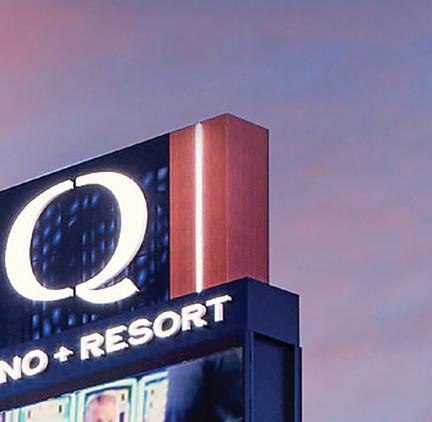
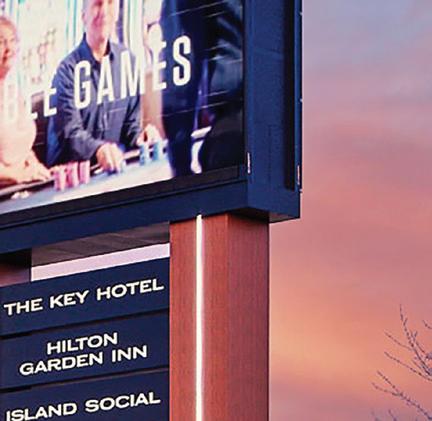


Anthony Williams, newly appointed President and CEO of the Dubuque Racing Association and Q Casino & Resort, joins Gaming America to discuss the opportunity ahead of him.
Following an extensive search for a new President and CEO of the company, as well as for Q Casino & Resort in Dubuque, Iowa, the DRA Executive Board of Directors appointed Anthony Williams to the role in April, with the hire officially taking effect on July 1. Following his appointment, the former MGM Resorts SVP of Operations Strategy sat down with Gaming America to discuss how his time with the operator, and as a certified life coach, led to a hopeful future with DRA and Q Casino & Resort.
With your official start date still approaching as we speak today, what are you looking forward to most about taking over the role of President and CEO?
This is what I consider a superb opportunity. It gives me a chance to become a resident and really integrate myself into a community that’s, of course, going to be new to me. But looking at the opportunity itself, at the end of the day I’m in charge of leadership, strategy and getting to set that course is what’s really exciting for me. As I get deeper
into the details and start to work with the Board and the Schmitt Development Corporation there in Iowa, we’ll be able to bring some things to light and plan out the future, which is exciting.
And with DRA and Q Casino & Resort, were those organizations you’ve held an interest in for quite some time, or more of a right place, right time opportunity?
It was definitely the latter. I think it was the right situation at the right time. And
once I started to really do my research and understand the setup, the overall operating dynamics and the relationship between the two, it just makes sense in terms of timing of where I am both career and in life.
What are the first steps or initiatives you’ll look to introduce in the early going?
When you take on any role, but certainly a role of this magnitude and level of responsibility, things are going to be important right away such as the overall performance of the operations, the culture and the people. Understanding the leadership teams and what they do, and understanding different market dynamics for things that make up the success ratios and really support the overall business.
As quickly as possible I’d like to integrate myself into both the business operations themselves and there’s the community at large piece to this that I think is very important. Understanding where we operate, who our customers are, who the folks are out there that we support… they need us and look to us for guidance.
Given your experience with operators such as MGM Resorts, is there any carryover that can be brought into DRA and Q Casino & Resort?
Definitely. This is very customer-centric in terms of – you’ve got your internal customers, the employees which of course are the lifeline of the operation, and then you’ve also got the community at large, so external customers that come in and they’re considered patrons. They are looking for great service and to have a good time. I think those skills of operating in the hospitality industry for so many years will greatly carry over into exactly what this opportunity lends itself to.
When you think about the Schmitt Island development, the community at large and opportunities for growth, all of my prior experience here as a Planning Commissioner for the City of Las Vegas – and
all of the ancillary duties that go along with that – should bode well for me in Dubuque.
Do you foresee any key differences in shifting from an area such as Las Vegas to a more community-driven market like Dubuque?
Overall, when you look at the makeup of the city of Las Vegas and the city of Dubuque, you’ve got your city council, your city manager, your mayor, the leaders for each are very similar. The overarching story here is economic growth and development, being able to sustain but also building that community for tomorrow as well. And I think those things are very similar whether it be Las Vegas or Dubuque.
There’s always going to be a need for addressing those things that create possible pain points in a city or there may be challenges to overcome, but it takes total collaboration across all departments and segments within the city to be successful. It’s certainly a fair point if you think about size and scale, of course. There are going be some differences but, at the end of the day, we’re talking about the wellbeing of a community, we’re talking about the future of a community and we’re talking about the ability to work across all lines of partnership to be successful. I believe those things don’t change regardless of where you are.






Speaking on the wellbeing of a community, I’ve read you are actually a certified life coach to go along with your work in gaming and hospitality. Are there any ways in which the two intersect? Oh, absolutely. We’re in the business of people, right? When you think about the life coach discipline, there are several areas you can really delve into. For me, it’s just really being able to understand and practice the emotional intelligence side of things because, in your day-to-day interactions, sometimes there are difficulties, right? There are going to be challenges whether it be disagreements or misunderstandings.
As a leader, you want to make sure you’re able to effectively communicate, resolve conflict and be able to work across multiple lines – which is not always easy. It’s about being approachable, but also knowing how to approach others, help them really understand the mission at large and selfmotivate to all move in the same direction. There’s also a self-awareness and selfmanagement piece to this too for myself. In difficult situations, knowing how to collect yourself and respond is very important to the overall mission and goal you’re looking to accomplish.

























With DRA and Q Casino & Resort celebrating its 40th anniversary in 2025, could you take us through what consumers can expect for the remainder of this year and possibly even beyond?
















































ANTHONY WILLIAMS President and CEO DRA and Q Casino Resort
I know there are going to be some specific on-site celebrations and entertainment. The team is currently working on exciting activations for the property and, once I’m on board July 1, I’ll be able to really start to engender myself into the operation and better understand as we go forward.
It’s an extremely rich history over the past 40 years and how it evolved over time. Once again, I can’t express enough excitement around how the future is very bright and all that’s been done already, but I can also sit here and say as we continue to move forward, our best days are certainly ahead of us.














Ainsworth Game Technology (AGT), founded by industry pioneer Leonard “Len” Ainsworth and celebrating its 30-year anniversary in 2025, has risen from a modest enterprise into a leading supplier of gaming solutions, currently operating in over 50 countries across Australia, North America, LatAm, Europe and Asia.























To understand the origin of AGT, one must first examine the career of its Founder, a towering figure in gaming and often credited with revolutionizing slot machine manufacturing in Australia. Before founding AGT, Ainsworth established Aristocrat Leisure in 1953, a company that would go on to become one of the world’s largest manufacturers of slot machines and online gaming entertainment.


significant funds to his family and philanthropy. After thankfully recovering from the diagnosis and maintaining his desire for gaming innovation, Ainsworth re-entered the gaming industry by starting AGT in 1995 at the age of 71. The move underscored his ambition to create a new legacy distinct from Aristocrat, despite his experience with the company playing an unmistakable role in AGT’s early strategies, particularly its focus on gaming machines tailored to land-based casinos.








Aristocrat began as a side venture to supplement Ainsworth’s dental supplies and equipment business, a line of work inherited from his father, until the introduction of poker machines proved highly lucrative for the company and helped transform Aristocrat into the global leader it stands as today.



demands. The supplier’s initial focus was to create gaming machines with advanced electronics, evident in the development of Ambassador, AGT’s first flagship gaming cabinet – launched in 2001.










In 1984, following a prostate cancer diagnosis, Ainsworth chose to sell his majority stake in Aristocrat, redirecting



“In a nutshell, Mr. Ainsworth got bored when he retired and sold out of Aristocrat and decided at the ripe old age of 71 he was going to start another gaming company. From those humble beginnings back in 1995, the original focus was always to emulate and double up what he had achieved previously at Aristocrat,” Ainsworth VP of Product Strategy, Marketing and Sales Sean Evans exclusively told Gaming America . “Mr. Ainsworth is a very, very competitive individual. There were reasons as to why he stepped out of Aristocrat but eventually he said to himself, ‘I can do that again.’”









The Ambassador marked a significant milestone for AGT, as the gaming machine set itself apart from competitors by offering a visually immersive player experience. The game’s technology and processor supported complex game designs, providing a point of differentiation in the competitive landbased casino market. The Ambassador’s success established AGT as a serious contender, particularly in Australia, where it quickly gained traction among casino operators.














Unlike Aristocrat, which had grown into a corporate goliath, AGT was established as a more agile enterprise, emphasizing innovation and responsiveness to market








































“It was very Australian-centric through those first five years. After that, the next move was this office we’re in (in Florida) for LatAm before the next step in evolution was of course entering North America,” Evans described. “I would say we kicked off in the North American marketplace around 2003, about eight years after the original foundation. Pretty much with any global company and/or gaming company, you invest the money in the product, both the hardware and the software, and if you can spread that across many different regions, it makes sense to expand.























































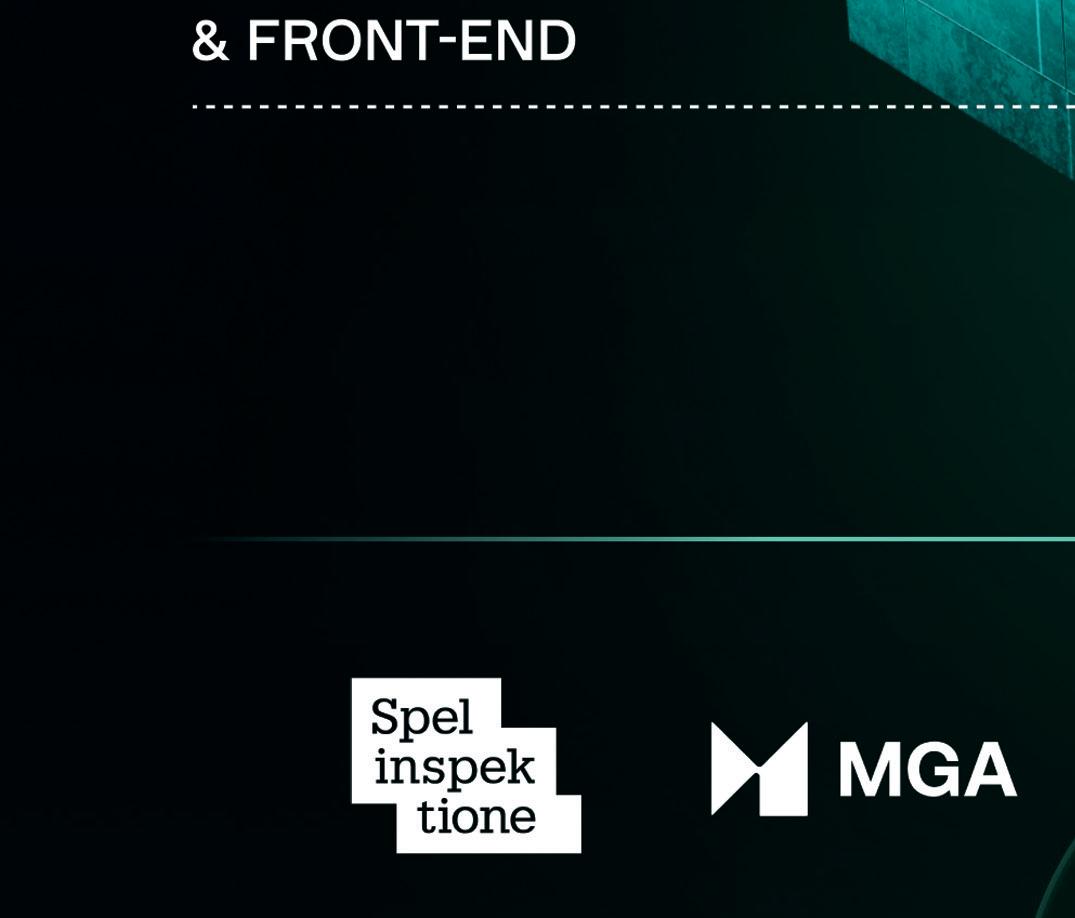
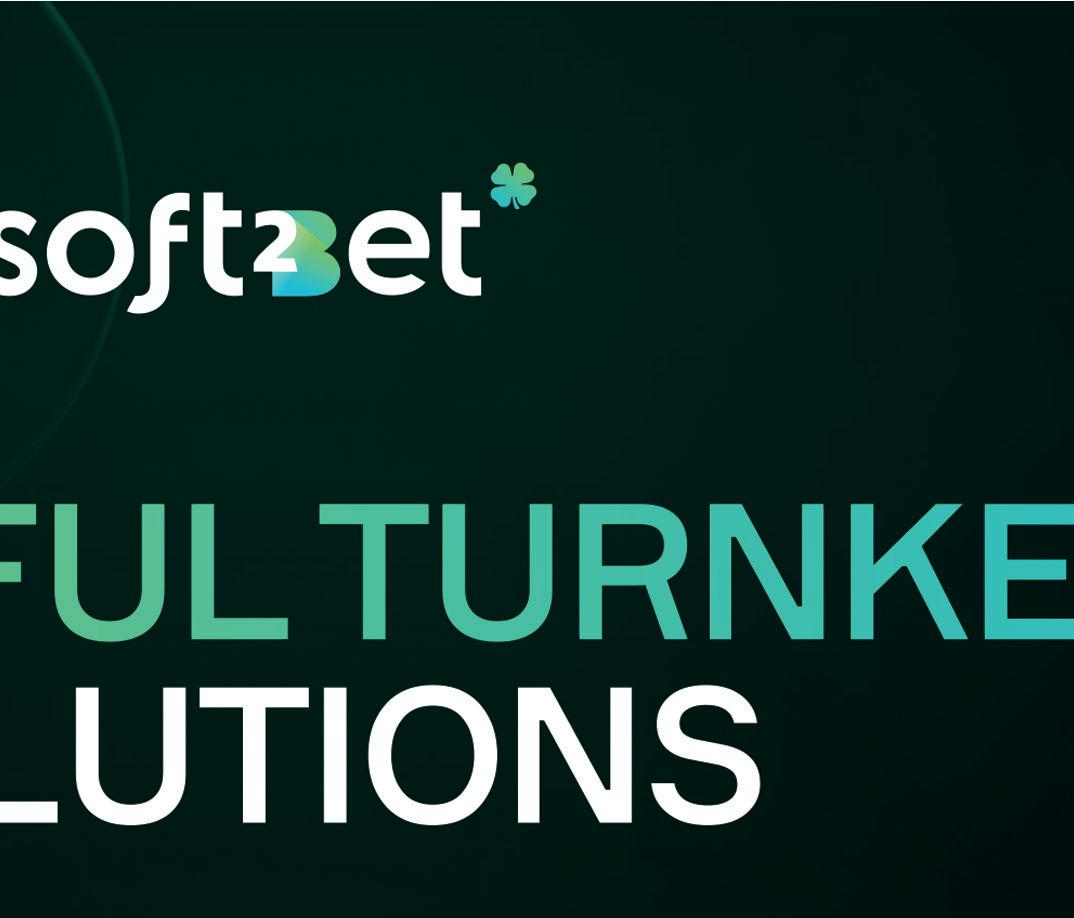

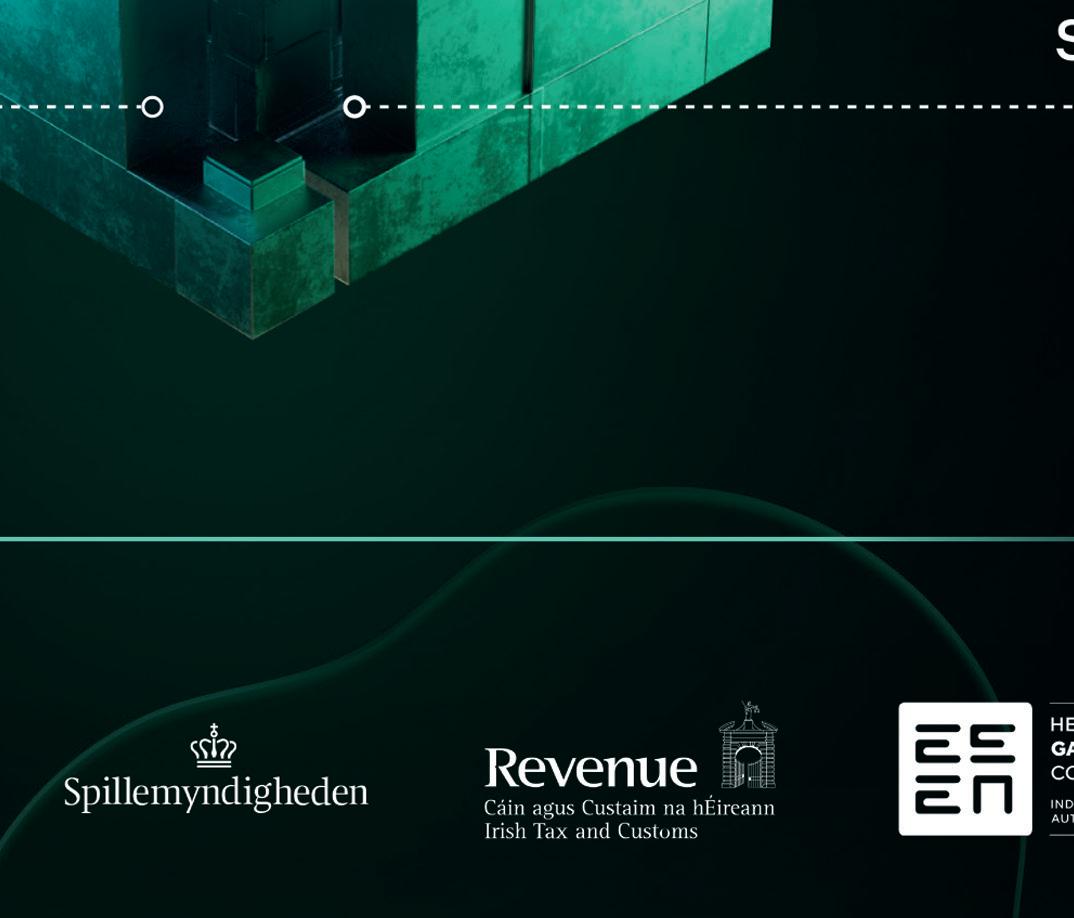
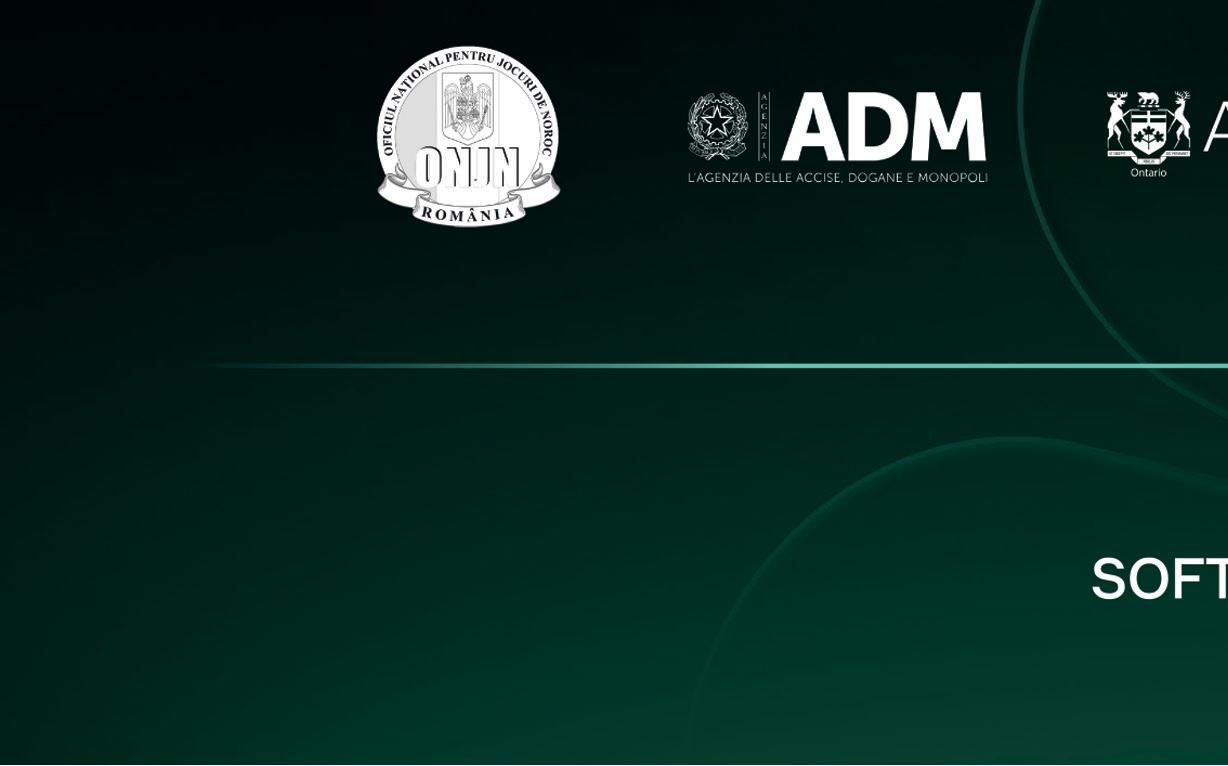
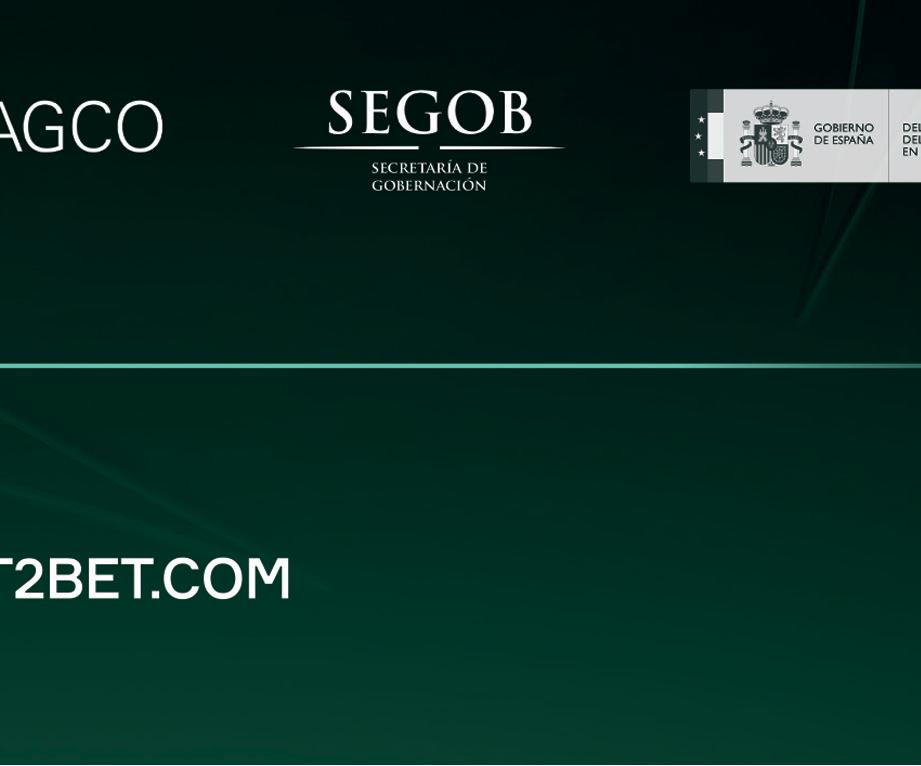











And we’re seeing this evolution come quicker in North America.”

Following the success of Ambassador, AGT pursued an aggressive product development strategy, introducing new gaming cabinets








and game titles specifically tailored to diverse markets. In 2007, the company launched the Ambassador SL, an enhanced version of its original cabinet that helped to solidify the company’s reputation for delivering












high-performing, innovative machines. The Ambassador SL supported a variety of games, including standalone progressives and linked jackpots, representing an immensely popular offering throughout the 2000s for casino players.








“MR. AINSWORTH IS A VERY, VERY COMPETITIVE INDIVIDUAL. THERE WERE REASONS AS TO WHY HE STEPPED OUT OF ARISTOCRAT BUT EVENTUALLY HE SAID TO HIMSELF, ‘I CAN DO THAT AGAIN.’” – SEAN EVANS


























Sean Evans, VP of Product Strategy, Marketing and Sales











AGT’s product portfolio also expanded to include branded products such as the Players Paradise linked jackpot, Quadshot game range and the A560 Wide Boy Reels of Wheels cabinet. These innovations helped AGT continue to build market share in Australia and laid the foundation for international expansion. The A560SL, introduced in 2013, became a standout performer across North America, with popular titles like Rumble Rumble driving previously unforeseen demand.










“My first exposure to an Ainsworth game was Quadshot. That was the first one I was sent to review, give my thoughts on and see if I could be inspired to do something similar. It was a great game, very Australian style, unique and they obviously knew what they were doing from where I was standing,” Ainsworth VP of Studios – North America Keith Kruczynski said.





“Throughout my whole career, Ainsworth was always one of the booths I had to stop by and see what cool new stuff they had. Back in 2022, I was given the opportunity to come on board here and it’s nice to see the company still has that trust, belief and desire to become one of the best, if not the best, gaming manufacturers in the world.”
























One of AGT’s early strengths was its expertise in high-denomination, or highdenom, video slots, which typically perform above the house average in terms of revenue generated. High-denom games, often played at $1, $2 or $5 denominations, appealed to a specific segment of casino patrons willing to wager higher amounts for potentially larger payouts. Looking ahead to 2016 when AGT would debut its US office, these highdenom offerings began to generate traction for the supplier in North America.

Despite its early successes, though, AGT found itself challenged by a wide range of competition, offering enhanced technology, graphics and sophistication













among large portfolios. AGT’s focus on solid, straightforward slot machines, which appealed to traditional players, also limited its ability to compete in emerging segments like low-denomination, highvolatility games. This gap in innovation prompted AGT to rethink its research and development (R&D) strategy in the years that followed, as the supplier would start to bridge a gap to the online scene.









titles released by the mid-2010s. The company capitalized on its existing land-based games, such as Rumble Rumble, The Enforcer and Eagle Bucks, but adapted each for online platforms. While these games retained the “landbased feel” with simpler graphics and mechanics, the catalog also managed to appeal to players seeking a nostalgic casino experience.
























marketing our brand and broadcasting our content into a new segment of players – who will potentially come back into a land-based casino and look for our boxes,” Lim explained. “And that education process – not only with Len because as soon as he understood it he was the biggest supporter of how we go forward with the digital side of things – but likewise with our land-based business, it was just sitting down with them and educating.”




In 2013, AGT made a strategic pivot by entering the online gaming market, a move driven by the growing popularity of iGaming and the need to diversify its revenue streams. Unlike its land-based portfolio, which focused exclusively on slots, AGT’s online offerings were developed in HTML5 format, ensuring compatibility across desktop and mobile devices, including iPhones, iPads, Android smartphones and tablets. Partnerships with major gaming platforms such as Microgaming, Playtech and iSoftBet facilitated the distribution of AGT’s online slots, enabling the company to reach a broader audience.

“Even Len himself had a lot of concerns. Initially it was, ‘look, we’re a land-based manufacturer, so if you do this online I can’t sell as many boxes.’ It was a big education process, but one of the biggest things was when the light bulb flipped: we could sell boxes while





“I was asked to come on probably in early 2012 because they were looking at how to approach the online business. And our whole focus was, ‘we have to do this in the right way. We want to approach it in a fully compliant manner and make sure we comply with all the regulations,’” Ainsworth Chief Digital Officer Jason Lim said.

“At that time in 2012, the highest form of online regulation was in Europe. So we got licensing and started on the European side, mainly because regulation wasn’t set up for online gambling in the US yet. We approached the established European market and that was really the starting point of how we entered the online segment; the technology has evolved ever since.”







However, AGT’s online game portfolio remained relatively small compared to industry leaders, with just over 100












AGT’s global expansion accelerated during this period, with the company establishing offices and distribution networks across North America, LatAm, Europe, Asia and New Zealand. By 2016,



















































AGT operated in approximately 50 countries, with a strong focus on the US and Asian markets.








The opening of its 291,000 sq ft North American headquarters in Las Vegas during 2016 was a pivotal moment, signaling AGT’s commitment to forming an established presence in the US market. The facility, designed by KGA Architecture, included manufacturing space and a modern office environment to foster collaboration among its 230 employees, including programmers, engineers and graphic artists.






























A strategic milestone occurred during 2016 when Austrian gaming company Novomatic AG acquired a majority stake in AGT for approximately $307.3m, providing AGT with financial backing and access to Novomatic’s extensive distribution network in Europe. AGT maintained operational independence, however, allowing it to continue developing its unique brand identity. Novomatic CEO Harald Neumann would eventually be named CEO of AGT during 2021, following a five-year tenure under the same title with Novomatic.








In 2015, AGT launched the A600 cabinet, a technologically advanced platform designed to support an extensive game library and enhance player engagement. Described by Len Ainsworth as a continuation of the company’s outlook for innovation, the A600 featured a classic design with superior game promotion qualities.




The A600’s release coincided with AGT’s motto, “experience counts,” reflecting its commitment to leveraging the supplier’s decades of industry expertise.













“OTHER COMPANIES I KNOW THERE'S A LOT OF COMPETITION BETWEEN THE STUDIOS AND, IN A PREVIOUS LIFE, ONE OF THE TERMS THAT WAS COINED WAS COMPETITIVE COOPERATION. WE'RE COOPERATING BUT WE'RE ALSO COMPETING AND I DIDN'T LIKE THAT EITHER BECAUSE I THOUGHT IT HAD TO BE ONE OR THE OTHER. HERE, IT'S JUST COOPERATION.” – KIETH KRUCZYNSKI


industry heavyweights such as Light & Wonder and Aristocrat, exemplifying the difference in collaborative motivation between land-based and online gaming.







In 2017, AGT signed a cross-licensing agreement with International Game Technology (IGT), one of the largest slot producers throughout North America. This partnership allowed AGT to integrate cutting-edge technologies and game mechanics, helping to ensure it remained competitive in the rapidly evolving iGaming industry, as well as the facilitation of new cabinet lines. The supplier would also eventually reach agreements with





“Online is very different from land-based, which is extremely competitive. From a land-based supplier’s point of view, they don’t partner with each other. You don’t see IGT partnering with Aristocrat or Light & Wonder, of course,” Lim said. “However, in the online space, one of our biggest partners is Light & Wonder, which we’ve had a relationship with now for over 10 years. Our second-largest partner through acquisition is Aristocrat, so that’s an unusual combination but in an online space it works.”















five-year goals; we have already been able to achieve some, but making the next step – and the next step and the next step – is always the hardest part,” Evans said.







By the late 2010s, AGT recognized the need to modernize its game development processes to remain competitive, understanding its place in the industry as the very best of second-tier suppliers. This hasn’t stopped Evans from setting personal goals, though, as he believes Ainsworth could still be challenging the largest suppliers for years to come.








“We want to become the best of the non-top three, and then we’ll think about taking on those companies. Especially in the gaming space, there can be people who aspire too much. Everyone should have goals, but it can be pretty destabilising to the company if you try to push for that too quickly, or you don’t realize the space you’re in.”









“We’re not looking at your IGTs, Aristocrats and Light & Wonders yet, but we do want to become the best of the mid-tier. We’ve set ourselves some lofty











Kruczynski, whose experience leading up to joining AGT included stops with Bally Technologies, Gaming Arts and IGT, shared a similar sentiment, telling Gaming America, “I don’t think we’re trying to be anybody else, especially given the history of Ainsworth. “There’s a ton of internal brands we haven’t even tapped into yet. I mentioned Quadshot, but there’s also Quickspin, Mustang, which is one we’re certainly looking at right now, Thundercash, a lot of those great older titles that are just begging to have new life breathed into them. And those weren’t from anybody else, those were done by our predecessors in Australia, so I do believe we have our own identity.”















Kruczynski continued: “One of the


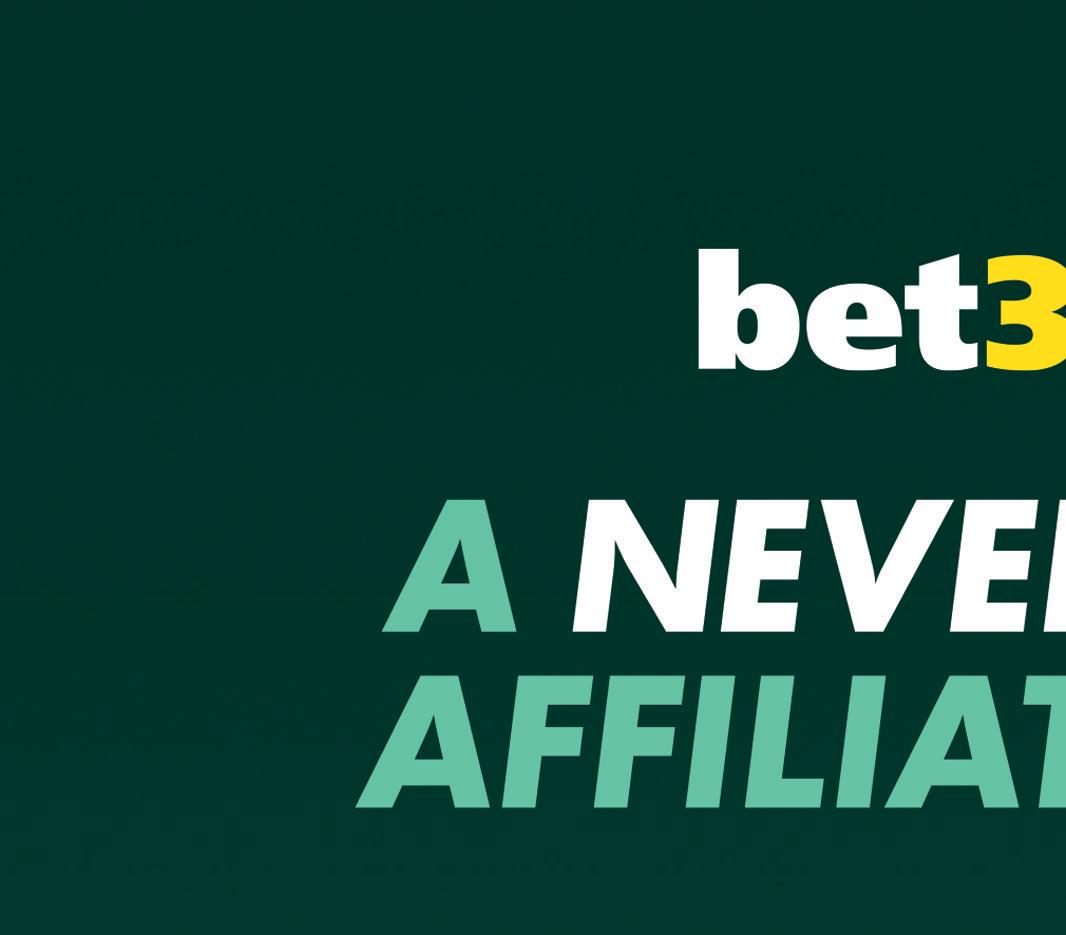



















more rewarding moments for me was at G2E two years ago when some of my colleagues from other companies came into the Ainsworth booth and said


‘wow, this is pretty cool’ because, when the competition starts seeing you and asking questions, you know you’re onto something.”
























� ONLINE IS VERY DIFFERENT FROM LAND-BASED, WHICH IS EXTREMELY COMPETITIVE. FROM A LAND-BASED SUPPLIER'S POINT OF VIEW, THEY DON'T PARTNER WITH EACH OTHER. YOU DON'T SEE IGT PARTNERING WITH ARISTOCRAT OR LIGHT & WONDER, OF COURSE.” – JASON LIM

























Each of AGT’s newly established studios were tasked with developing games tailored to specific markets, especially titles that resonated with local player preferences. For example, the Australian studios focused on games for the domestic market, while the North American studios targeted US and Canadian-based casinos. This localized approach improved game performance and allowed AGT to experiment with new mechanics, such as pot-style games, which became highly popular among targeted demographics.























“One of the biggest decisions, and frankly I was a little bit worried about it at first, was when Harald decided we were not going to do global development from the studio standpoint,” Kruczynski said. “Studios in North America would only be making games for North America, Australia would only be making games for Australia and so forth with Mexico, Europe and Asia. I think that’s something that really differentiates us and allows us to cater more to the area that we’re in. I’m not aware of any other company that’s doing that currently.”





















AGT’s high-denom games continued to excel, with titles like Grand Legacy on the A-Star Slant cabinet and games on the A-Star Dual cabinet achieving top performance metrics in North America. The QuickSpin series, launched in 2017, quickly became one of AGT’s most successful game groups, consistently ranking among the top-earning slots in industry surveys with games such as Super Hot 7s and Super Charged 7s. Having appealed to both lowdenomination and high-denom players, the series’ success would prompt entry expansion, including a MultiPlay version allowing players to spin up to four reel sets simultaneously. The growth would also see AGT forge new paths, as the supplier would make its first move into the historical horse racing (HHR) market.








AGT pioneered the HHR genre by partnering with Churchill Downs Inc. (CDI) in 2020 to develop a platform that






























translated historical horse race data into slot results. By 2021, AGT had deployed over 2,000 HHR machines with 3,500 games, establishing itself as a leader in this emerging market. HHR games, which combine traditional slot features with race-based outcomes, appealed to jurisdictions where traditional slots were restricted, such as Kentucky and Virginia.






acquisitions, we were able to get into the Class II space and parlay that technology into development with Churchill Downs for an HHR system. We were one of the leaders in the HHR space and found that covering multiple verticals was a real key for success.”

















In addition, AGT expanded its presence in Class II gaming, which operates under Tribal gaming regulations throughout the US. The 2018 debut of the A640 cabinet’s Class II version, featuring titles like Pac-Man Wild Edition, marked a significant milestone for AGT. The A640’s 40-inch LCD touchscreen and dynamic game content captured players’ attention, while the AnyBet progressive link enabled life-changing jackpots at various bet levels.






“The Rumble Rumble range is what I’ll call the breakthrough in the early-to-midteens, which became diversified to fit not just low-denomination players but also high-denom consumers. For us, that was probably the catalyst for North American growth,” Evans said. “And through

















In 2023, AGT introduced the A-Star Raptor cabinet, which quickly became a success in US casinos through featuring a sleek design, curved monitor, dynamic LED lighting and a state-of-the-art LCD touchscreen button deck. The Raptor cabinet represented a leap forward in AGT’s hardware innovation and at the 2024 Global Gaming Expo (G2E), AGT showcased this progress with new titles like Rocket Link Freedom and Rocket Link Liberty. The games were designed specifically for Class II and HHR markets, with additional plans to expand to Class III markets also expected.






San Bao Pandas and Dragons and new games like Neon’s Bonus Blast. The company’s focus on data-driven, playerfocused development, led by Kruczynski, guaranteed that new games aligned with market trends and player preferences. While many suppliers within gaming create a sense of internal competition to build success, Kruczynski notes how Ainsworth has managed to grow with a more cooperative mindset.



















The Raptor cabinet’s success was complemented by AGT’s growing portfolio of titles, which included classics such as
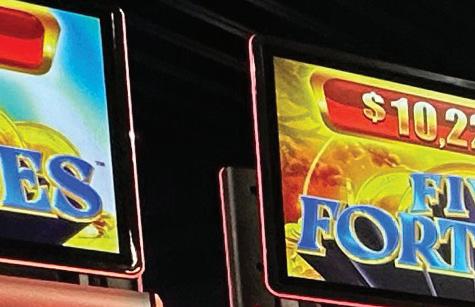




“At other companies I know, there’s a lot of competition between the studios and, in a previous life, one of the terms that was coined was competitive cooperation. We’re cooperating but we’re also competing: I didn’t like that either because I thought it had to be one or the other. Here, it’s just cooperation. We all want to see each other succeed and anytime the Australia studio puts out a great game, the Austin studio is not going to be jealous. They’re going to say, ‘damn, nice job, now I’m going to go see if I can level up,’” Kruczynski said.





“That’s the way it should be. I’m not













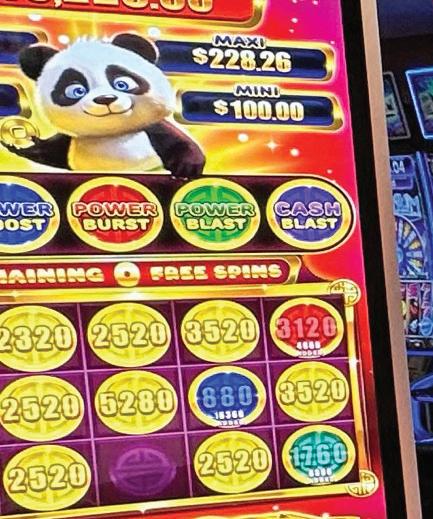







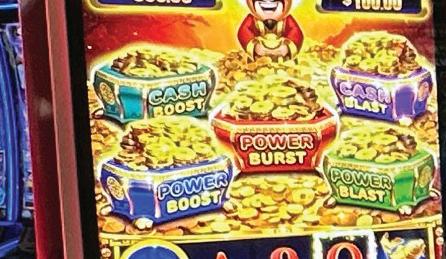
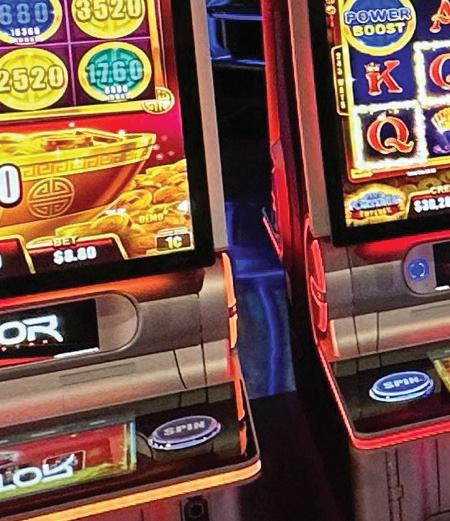















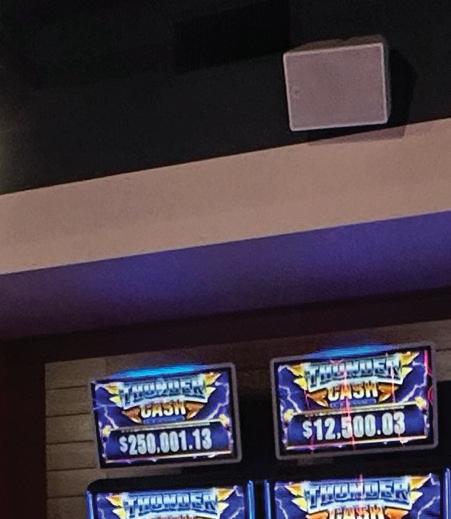













































a huge fan of competing studios. Even looking at competitors, I want to win. I’m a very competitive person. But I also appreciate the work that they’re doing and I can say ‘hey, this is a great job, you should be really proud of this’ – without wanting to see them fail.”
















Despite its successes, AGT still faces ongoing challenges in a highly competitive industry, dominated by giants like IGT, Aristocrat and Light & Wonder, which consistently force Ainsworth to find new opportunities for expansion whether through land-based or online. To create more financial stability and explore new growth ventures, AGT’s Independent Board Committee recommended authorization for Novomatic to purchase its remaining outstanding shares for an approximate value of $220m in April 2025.












“The acquisition of Ainsworth is consistent with our international growth strategy and the expansion of our presence across the Asia-Pacific and the US region. As a long-term shareholder we are familiar with the business and believe that integrating Ainsworth into our operations is in the best interest of this strategy. We look forward to welcoming the highly qualified and experienced Ainsworth employees into the Novomatic family to become part of our international growth and success,” Novomatic Executive Board Member Stefan Krenn said during the announcement.









AGT’s established research and development operations, particularly in next-generation cabinets and server-based technologies, are now backed by Novomatic’s financial positioning, with an accelerated rollout of new hardware and digital solutions expected once integration is complete.







AGT’s history is a testament to the vision and resilience of its Founder, Len, whose legacy now spans over seven decades. From its debut in 1995 to its current status as a global supplier of gaming solutions, AGT has navigated challenges and capitalized on opportunities to establish a strong presence in the land-based and online




gaming markets. Key innovations like the Ambassador, A-Star Raptor and QuickSpin series have driven performance, while strategic partnerships with Novomatic and IGT enhanced its competitive edge among the supplier industry.














“I think Mr. Ainsworth can be pretty proud of what the company’s achieved and where it’s gone. There have been some hard times of course, we’ve fluctuated anywhere between 1% ship share all the way up to 5-6%, but we’re going to keep providing. We’ll keep trying to produce the highest-quality gaming content possible for the best outcome for












our players, shareholders and customers,” Evans concluded.














In a rapidly evolving industry, AGT’s commitment to quality, innovation and player-focused development positions it for continued growth throughout 2025 and beyond. As the company expands its studio network and embraces new technologies, it remains a significant player in the global gaming landscape, carrying forward the legacy of its Founder while forging a path toward an increasingly dynamic future. Indeed, 30 years later, Ainsworth’s burning desire for innovation and unrelenting passion for gaming, lives on.
















With the gaming industry constantly evolving, executives from Eclipse Gaming , Galaxy Gaming , Gaming Arts , IGT and Interblock speak on the new demands brought forth by consumers.













BREE CARDONA, Director of Marketing, Eclipse Gaming Systems
As the Marketing Director at Eclipse Gaming, Cardona brings a results-driven approach to the development and execution of integrated marketing campaigns across diverse channels and product lines. With a strong focus on aligning creative strategies with key business objectives, she consistently delivers impactful and memorable results.
STEVE CVETKOSKI, VP of Product Development, Galaxy Gaming
A relative newcomer to gaming, Cvetkoski began his transition to the industry with Galaxy Gaming and has never looked back. Being fortunate enough to learn from one of the brightest minds in gaming, Cvetkoski discovered his love for product, and the industry, by creating custom games and progressives. Cvetkoski continues to call on his engineering background to drive Galaxy’s push to innovate and deliver the industry’s best and most unique content to market.
GREG COLELLA, CPO, Gaming Arts
With over 30 years of experience in the gaming industry, Colella brings a wealth of knowledge in product management, game development and product strategy. As Chief Product Officer for Gaming Arts, he currently oversees product management, marketing and game development for the supplier.
JEAN VENNEMAN, SVP of Studios, US – IGT
While at IGT, Venneman has held positions with global responsibility in sales, product development, product management and brand licensing. She has also held various executive roles for Scientific Games, Bally Technologies and Gaming Arts, with oversight for sales, marketing and product management.
JOHN CONNELLY, Global CEO, Interblock
Connelly is a highly respected and accomplished executive in the gaming industry, with over 30 years of leadership experience spanning business development, mergers and acquisitions and innovation across both land-based and digital sectors. Since joining Interblock as Global Chief Executive Officer in January 2015, Connelly has played a pivotal role in transforming the company into a premier international supplier of luxury electronic table gaming (ETG) products.
Bree Cardona: It’s all a harmonious balance between innovation and the familiarity that resonates with the player. Growing pots, wheels and hold and spin features are classics now that returning players expect from their favorite games. We are also leaning into fast follows that allow us to create entertaining experiences to draw both existing and new players to games in the tribal market.



John Connelly: Our focus remains centered on delivering products that help casino floors evolve alongside the expectations of modern players. We are designing games that combine the authenticity of live table play with the speed, accessibility and personalization of digital entertainment. Features that are most vital to player experience include intuitive interfaces, real-time stats and betting trends, quick game cycles and the ability to engage with multiple games from a single screen. A variety of new play mechanics and features will be introduced at this year’s G2E in Las Vegas. The evolution of technology within this sector will reach new levels as we enter 2026, with both existing and new products upgraded to offer greater capabilities in handle, hold and, most importantly, the ability to attract a new wallet to the casino floor.


What is the current focus when creating new games for casino floors and which features are most vital to player experience


Greg Colella: At Gaming Arts, our current focus is developing market-trending slot games with players at the core of our design. We prioritize playerfocused mechanics and innovative UI improvements that enhance the experience and ultimately translate to stronger game performance. By aligning with market trends while innovating across game mechanics and hardware, we aim to deliver engaging titles that both entertain and perform.



Steve Cvetkoski: Different players value different features and aspects of games. Some players may want more volatility, while others look for more predictable play. Our focus is on striking a balance between something new and exciting, yet easily accessible. The key is finding the feature or mechanic that is almost instantly understood, but compelling enough to keep the excitement level high.


Jean Venneman: A key focus of IGT’s content strategy is expanding upon popular industry trends and player preferences to create new games with multiple dimensions of entertainment. Given that today’s slots games are far more layered than they once were, this focus impacts nearly every aspect of game design and development. To create content-rich games for today’s players, we deliver multiple bonus events, leverage popular mechanics, incorporate “easter eggs,” invest in top-notch audio and graphics and more. All this attention to detail helps IGT deliver the multifaceted experience that today’s players enjoy and expect.












Bree Cardona: Competition is incredibly fierce with companies bringing in the best and brightest minds. We make sure to focus on the players and demographics as they change and develop relationships with the tribal communities in order to remain connected to who is enjoying our games. Players also expect a higher level of entertainment with more creative mechanics and storytelling within the games.




Steve Cvetkoski: There was more emphasis on creating something completely different than anything in the market. However, we are seeing that it is now more important to keep games simple and not overly complicate them simply for the sake of being unique. Even if those games are given the initial opportunity, they do not necessarily have the staying power to remain on the floor. Games need to be fun, not a chore. If not, players may feel intimidated, and dealers may find it confusing; two things sure to get the game removed. things removed.

How have preferences from players and operators as well as the process of designing games changed in recent times









Greg Colella: Player preferences are constantly shifting, but the desire for entertainment and big wins remains. With diverse demographics in play, a mix of design elements are essential – games that offer strong entertainment value, volatility and familiar bonuses with a fresh twist. Multiple denomination options have also become more common, as players move beyond penny play into mid and high-denom ranges. Gaming Arts’ new San Din Fu game series supports these preferences with a blend of top-tier entertainment features, perceived persistence, multiple denoms and big win potential, all designed to keep players engaged and operators satisfied.











John Connelly: Both player and operator expectations have shifted significantly in recent years. Players are seeking faster gameplay, more engaging side bets and statistics and designs that reflect the digital experiences they’re used to. On the operator side, there is growing demand for labor-efficient, adaptable products that fit within a variety of floor configurations. As a result, the process of designing games has become more data-driven and collaborative. At Interblock, we take a modular approach – developing products that can be customized by market or player segment. This allows us to remain responsive, scalable and aligned with the evolving dynamics of land-based gaming.



















Jean Venneman: Two of the factors most heavily influencing the design of today’s games are player preferences related to presentation and play style. Today’s players are seeking high visual impact in their slots games. This translates to flashier merchandising, bigger cabinets, higher-resolution screens and brighter and bolder game design. When it comes to gameplay attributes, players are readily embracing games with clearly defined progressive jackpots, and we’re seeing worldwide popularity of the multi-pot mechanic. This is a mechanic that we’ve incorporated into many games across IGT’s portfolio and an area where incremental design innovation can have a big impact.
















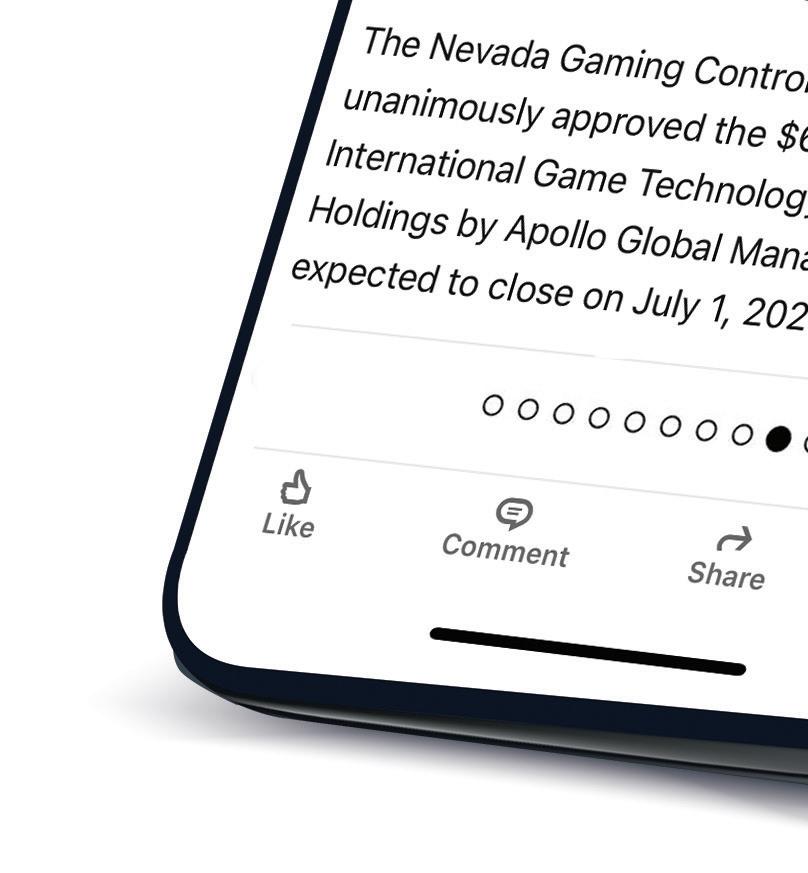


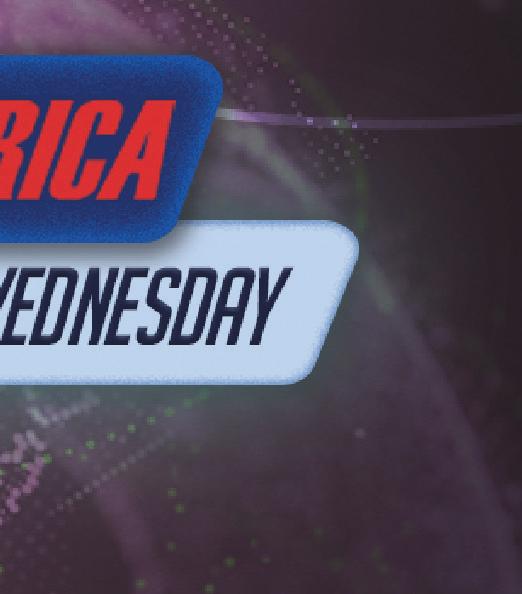




















Bree Cardona: Players rule the world when it comes to gaming. Every feature we put in is designed with the player in mind first. There’s no detail too small – from the chairs, to the sound, to individual colors. Player feedback sessions and focus groups are one way we center them in our design process. We also are excited to continue developing stronger partnerships with influencers who have earned the trust of their audiences and can provide insight to their needs and desires.




Steve Cvetkoski: Both operator and player feedback have a tremendous impact on our game development. We strive to build games that players will love and, in turn, will be profitable for the operator. What better way to ensure those two things are aligned than to focus on meeting their needs and desires?

What











John Connelly: The first question we must ask ourselves is: which consumer are we targeting? Today’s player is vastly different from the one we knew just a few years ago. We now need to blend the traditional casino perspective with an online vision – or vice versa. We must think about where the market will be five years from now, not just where it is today. Interblock’s innovation strategy and product roadmap are designed to utilize current trends and emerging technologies to deliver a product offering no other gaming company in the world can match.













Greg Colella: Consumer feedback plays a crucial role in shaping our games, but innovation is equally important. At Gaming Arts, we listen to what players and operators want while also ensuring our designs bring something new to the table. Striking the right balance between familiarity and creativity prevents market fatigue and keeps our games fresh and exciting for players.








Jean Venneman: Player feedback plays a critically important role in multiple phases of IGT’s game development process. One of IGT’s most impactful player touchpoints in the design process comes from our focus group testing program. Before a game is deemed complete, we host player focus group sessions where vetted slot players come to IGT’s campus to experience a new game and provide their valuable feedback on multiple aspects of a game, ranging from graphics and mechanics to jackpot levels, bet structures, audio and more. We then apply that feedback and refine or alter the game to create a better experience.



Bree Cardona: While iGaming is convenient, millennials and Gen Z have made it clear that they crave connection. There has been a shift in social media towards building communities, and the trends in the content they post provide a window to what motivates these players. Unique experiences like launch events and game series with interactive features can help facilitate community in a younger audience and support tribal gaming operators in attracting that demographic to their properties.


In what ways can suppliers maintain a land-based interest from younger demographics as iGaming becomes more prevalent


Greg Colella: To capture the attention of younger demographics, suppliers must deliver innovative, visually dynamic and engaging land-based experiences. At Gaming Arts, we are focusing on crafting immersive games that combine player-trending features, popular themes and strong sensory appeal. Our new Mod Ex cabinet series supports this by enhancing visual impact, sound and elevating the overall player experience. The atmosphere of a casino, the sounds, lights and collective excitement creates a unique energy that digital-only play can’t replicate.
To further bridge the gap between digital and physical play, we’re also building new relationships with top iGaming providers like Blueprint Gaming and White Hat Gaming. These partnerships allow Gaming Arts to take proven, top-performing iGaming titles and reimagine them for the land-based environment. This fusion delivers an innovative and unique experience that sets us apart from other gaming manufacturers, giving younger players something truly fresh and engaging on the casino floor.

Steve Cvetkoski: The technology-based features that iGaming provides are not as easy to implement on the landbased side. Some of those aspects are hard to overcome. However, the social engagement and person-to-person experience you find with land-based gaming is not easily found online. Landbased casinos can certainly tap into and enhance that aspect, while naturally incorporating more technology on the table and in the pit.







John Connelly: Omnichannel development is now a prerequisite for any new product introduced by Interblock. Today’s player base is more sophisticated than at any other point in gaming history. To meet this demand and enable traditional casinos to remain relevant, we must bring new forms of innovation to the floor sooner rather than later. Younger players engage differently – they value speed, intuitive interaction and entertainment that feels social and immersive. To maintain their interest in land-based environments, we must build products that reflect those expectations while preserving the core appeal of live casino play. That means integrating touchscreen betting, immersive visuals, fast-paced formats and real-time engagement tools.


Jean Venneman: For the industry to attract the interest of the next generation of casino players, we must continuously evolve our offering and innovate in ways that are meaningful to new players. At IGT, we find incremental innovation just as important as disruptive innovation in many cases. While casino players enjoy large screen sizes, we also recognize that younger demographics of players are accustomed to having the option of content portability via their personal mobile devices. That influences their expectations in other settings and is something, for example, that influences our hardware and content strategy, as well as our omnichannel game roadmap.
























































With expert guest contributions, Gaming America looks into the issues at the heart of Latin American gaming. In this edition:










50





Influencers (and their transgressions) are very topical within LatAm right now...






















52












Argentinian lawyer Tomás Enrique García Botta talks further about influencers

































55























Hugo Baungartner gives us his take on the Brazilian market

























































































56














Betsul CEO Fernando Garita on LatAm localization





















60
Alfredo Lazcano and Andrea Avedillo assess developments in Mexico
62
















Elvis Lourenço warns against an unworkable model in Brazil










As the LatAm gaming industry continues to expand rapidly, new regulated markets, suppliers and operators have begun forming partnerships in various countries.
In Mexico, the fusion of influencer culture and sports betting has gotten bigger, particularly through collaborations with Caliente.mx, the country’s leading betting platform. Prominent YouTuber Werevertumorro has been a notable figure in this space, engaging audiences with betting-related content during major sporting events like the FIFA World Cup. Additionally, influencers have led their massive followings to promote betting activities. These partnerships often involve interactive content, live streams, and promotional offers, aiming to convert viewers into active users by creating a sense of urgency and exclusivity. However, these partnerships have not yet drawn serious regulatory concern and have faced little public backlash.
Colombia has experienced both regulated partnerships and regulatory crackdowns. While licensed operators have appointed public figures to serve as ambassadors , including a former national footballer in 2024, the Government has also acted against unlicensed activity. National regulator Coljuegos identified around 300 social media accounts linked to unauthorised betting ads or illicit prize giveaways, and requested that several influencer accounts be taken down. Popular internet figures were named in ongoing investigations into unlicensed gambling promotions. In some cases, industry associations led formal complaints, prompting criminal cases. These actions reflect Colombia’s efforts to uphold regulation and hold influencers accountable in the country’s betting ecosystem.

In Peru, the mix of influencer marketing and betting platforms is emerging, but more subtly: betting companies have worked with local influencers during major tournaments, though these deals have received minimal attention, showing that the Peruvian public has a bigger focus on lifestyle and entertainment content.
In Brazil, 2024 and 2025 saw online betting platforms partner with top influencers and celebrities through high-value sponsorship deals, sparking ongoing public debate. Virgínia Fonseca, the biggest influencer in the country, was reported to receive around 30% of her followers’ betting revenue in commission for promoting a platform, along with an upfront payment of BR50m ($8.79m) – and a BR29m annual contract with an online casino.


Puerto Rico saw a more traditional market entry by a global operator in 2025, with influencer collaborations emerging later through sports-related creators. Even though the betting landscape has evolved with major players like FanDuel, its marketing strategies have primarily focused on traditional advertising and partnerships within the sports industry, so the incorporation of local influencers into their promotional campaigns has not been prominently reported.





Footballer Neymar also became a brand ambassador for the same platform under an estimated BR100m yearly deal, promoting the platform across his massive digital footprint. Authorities and media raised concerns about the ethics and legality of such promotions, especially after a police investigation into unlicensed gambling and money laundering named several public figures.




In Argentina, the rise of influencer-led betting promotions has led to significant legal action. Authorities in Buenos Aires launched a large-scale operation targeting unlicensed online gambling, resulting in the opening of criminal cases and investigations into 16 prominent figures from television and social media, eventually expanding to over 100 public figures under scrutiny. Perhaps most controversial was Wanda Nara, who, despite being formally indicted for advertising the banned site Hititbet, continued promoting the platform in defiance of court orders. Concerns over underage gambling were also raised and these events have drawn widespread media attention and increased enforcement of gambling ad regulations, overshadowing partnerships within the country’s newly regulated sector.




A national exposé revealed that some influencer-endorsed games were fraudulent, with creators allegedly given demo accounts that faked wins, while regular users experienced rigged losses, leading to the Operation Game Over police investigation. The combination of celebrity deals, legal probes and ethical concerns has sparked a national conversation around influencer accountability and the urgent need for clearer regulation.

























MF Estudio - Abogados Attorney Partner Tomás Enrique García Botta takes Gaming America through the role of influencers in Argentina, the black market, a Trojan Horse and ‘floating casinos’...
While Argentinian hit series ‘The Eternaut’ is watched around the world, Argentinian gaming is currently moving at a slower rate of growth. With regulatory uncertainty, and concern surrounding black markets and underage gambling, Argentinian gambling is at an important juncture. On May 16, for example, the city of Mar del Plata, Argentina, unanimously approved a motion to stop the rise of online gambling addiction among young people.
In addition to limiting access to betting sites from educational establishments, the motion aims to reopen the debate on youth gambling addiction and the impact of sports betting on mental health. Argentina’s Chamber of Deputies also
approved a bill aimed at banning online gambling advertisements nationwide on November 27, 2024, which passed with 139 votes in favor, 36 against and 59 abstentions, now awaiting consideration by the Senate at the time of writing.
MF Estudio – Abogados Attorney Partner Tomas Enrique Garcia Botta joined Gaming America at the SBC Summit Americas in Fort Lauderdale to discuss the issues seen in Argentina and share his views on the legislation being considered by the country’s Senate. Botta also spoke on the role of influencers in Argentina and how a lack of knowledge has resulted in criminal action against certain public figures.
What impact do influencers play in the gaming scene across Argentina?
To give a proper understanding, Argentina is a federal country and it is very similar to the US where, instead of having 50 states, we have 24 provinces. Out of those 24 provinces, there are a few that have had online gaming, casino and sportsbook operations for almost 16-17 years or more. They have gone pretty much unnoticed because they were smaller provinces until 2019 or 2020, when the big jurisdictions started regulating the city of Buenos Aires, which eventually led to the vision of Argentina as a regulated online gaming market.
So how do influencers come into play? They are mostly affiliates and they lead customers to operators. There is an issue in Argentina with poor channelization of the market and it is estimated that around 10% of the market is legal, whereas the remaining 90% is illegal. This is key to influencers because they don’t know any better and they mostly promote blackmarket sites, which leads to their activity becoming top of mind for society. They get caught having public figures go on TV and then you have a quite strong backlash from the audience that sees minors being directed to gambling products. But since they are being directed to unregulated or illegal gambling products, there aren’t any measures in place that can prevent them from participating.
The conversation with influencers right now is that there is no regulation and, as I said, you could have potentially 24 different regulations covering the same topic, which is the activity of an influencer. Because online activity doesn’t do well with geographical boundaries, it becomes messy. Studies conducted by the Association of State Lotteries in Argentina suggest influencers are one of the main forces attracting minors into gambling. This is when influencers in of themselves become very relevant as it’s somehow a centerpiece to the strategy of fighting the black market, but you don’t have specific criminal provisions to cater for the activity of influencers.
Is it worth it for a black-market site to utilise influencer promotion, if it may result in higher regulatory scrutiny of its operation?
They want traffic. They will bring traffic any way they can and in any way they see suitable. This is also when enforcement comes into place, because the vision from a black-market operator currently is: there are no consequences.
We had a situation where influencers were openly promoting black-market sites and the initial reaction was to contact the influencers and begin reporting the accounts to relevant social media
platforms. This didn’t really work so influencers, in most cases, became affiliates and because they were on revenue-sharing agreements, it was argued they were partners to the black-market operators.





influencers, subpoenas were
By becoming partners of the black market you could very well say they are offering gaming without approval. Criminal actions were filed against top influencers, subpoenas were issued and now they are being subject to criminal proceedings. We don’t know the outcome yet, but this has had a beneficial impact on the social media platforms, because you start to see less activity related to the black market.








Could you also speak on legislation currently being discussed in Argentina in regards to prohibiting online gambling advertisements?
Yes, there are a number of bills that were mainly motivated by underage gambling. The politicians believe resolving this issue is by limiting advertising and attacking the regulated sector, which is an incorrect approach in my view. Minors playing is

TOMÁS ENRIQUE GARCÍA BOTTA Partner MF Estudio – Abogados



a symptom, but it’s not the disease. The disease is a lack of enforcement, and this is where we stand right now. One of those bills, despite several having been filed or brought to Congress, was approved by the House of Representatives in November 2024. It will be treated by a joint commission, but it’s currently within the internal process of the Senate. If I had to say just one thing, however, the approach is incorrect. There is an issue with the black market and minors playing is a reflection of this issue. You need to fight the black market and, as a national congress, you need to be aware of your limitations. You cannot step into the provinces and tell them whether they can issue licenses, allow advertising, set the conditions to apply for a license and ultimately ban any sponsorships or promotions. It is the provinces that need to regulate, the Federal Government cannot step in and say, ‘Okay, I’m regulating this.’

A massive challenge for the industry is working together to educate the audience on the issues involved, the stakes and the risks. Instead of a bill to fight the black market, it’s a bill to promote the black market that is currently being drafted. It’s a Trojan Horse. The bill will be approved and then you will hand over the keys to the black-market operators that don’t pay taxes, allow minors to play, are involved in criminal activities, don’t
protect consumers, don’t abide by AML regulations and are, overall, criminals.
With Argentina operating similarly to the US in that provinces are responsible for individual regulation, could you foresee a compromise of sorts to restrict black-market activity?
At least from a strictly legal point of view, in Argentina, if you don’t have approval, you can’t do it, so the lack of a framework means you cannot do it. The challenge is the fact that you are using tools from the 19th and 20th centuries to fight an activity that is running on technology that is way more advanced. You will block a URL, then you have three mirror sites and they will update every day and it’s a never-ending story.
The approach should be holistic. You go after influencers, request URL blocks, follow the money and see how customers are gambling on illegal sites, funding their accounts and collecting payments. This is part of the work and requires interaction with federal offices, local offices and different regulatory frameworks, which is in the making at this time.
We’ve also heard the term “floating casino” in Argentina. What does this mean specifically for land-based gaming within the country?
The city of Buenos Aires has a specific situation because it is the seat of the Federal Government and, until 1994, when the national constitution in Argentina was reformed, it had a special status within the organization of the country. After the amendment to the constitution in
1994, the city of Buenos Aires was given an autonomous status. They have their own constitution and now they are able to elect the judiciary and legislative branches as well as a proper executive.






So how does the floating casino come into place? The concession to operate was granted before the constitution of the city of Buenos Aires was enacted. It’s not sitting on a river because it needs to be seated on a river; but because it was said the river was subject to federal jurisdiction and the concession was granted by the National Lottery – it kept going based on that. Now, the National Lottery is dissolved and all the competencies were transferred over to the city of Buenos Aires.

a river; but because it was said the





There is no obligation. In fact, if you go to the constitution for the city of Buenos Aires, you will see a specific section that addresses gambling and the possibility of operating gaming within the city. It’s not necessarily a situation where this one waterside or riverside casino needed to do it, it was just older framework or older laws from back when the city of Buenos Aires did not have this autonomous status. There is also a slot hall sitting underneath the Palermo racetrack. The difference between the floating casino and the racetrack has to do with the fact that





you don’t have tables in the racetrack; it’s just electronic gaming machines.
you don’t have tables in the racetrack;
So any casino in Argentina would have authorization to conduct business in Argentina as long as all necessary requirements are met?
Yes, but unlike other jurisdictions or other markets, it’s not a straightforward process. They would need to call for a tender, which takes time, and it’s not a market where we normally have consultations from clients or prospective clients. They could think they have an opportunity to apply for the license, but this may or may not be the case depending on the moment in time they make the query.



















Hugo Baungartner , a new Executive Director at Esportes Gaming Brasil and previous Gaming America contributor, explains the differing opportunities for operators in Brazil.
The sports betting and iGaming market is experiencing a historic moment in Brazil. After years of investigation and maturation of the sector, regulation has finally moved forward, bringing legal certainty, greater revenue for the state and better protection for consumers and companies. It is a turning point for serious companies that have always operated responsibly and transparently, such as Esportes Gaming Brasil, with Esportes da Sorte and Onabet.
The approval of the regulatory framework, with the sanction of Law No. 14,790/23 and the conditional guidelines of the Ministry of Finance, represents a fundamental step towards the sustainable development of the industry. There are now transparent rules for those who wish to operate in the country, from integrity criteria to responsible gaming measures and social responsibility.
In this new order, Esportes Gaming Brasil has positioned itself as one of the main references in the sector. We are a Brazilian brand that believes in the potential of our country and in the importance of effective regulation, which ensures a competitive and healthy environment, with strict compliance criteria.
The new regulated market presents
a significant opportunity for operators that follow international best practices in governance and compliance. Success in this environment rests on consistent investment in technology, strategic partnerships and initiatives that contribute to the broader sports ecosystem – including sponsorships and support for cultural projects, various sports disciplines and local clubs.













































































CBO and Executive Director
Esportes Gaming Brasil
Open dialogue in forums and institutional discussions is essential to shaping the future of Brazil’s regulated betting industry. These environments encourage a more professional, innovative and socially aligned sectorone that reflects the broader interests of Brazilian society. Brazil is about to consolidate itself as one of the largest regulated betting markets in the world. It is a process that requires responsibility, long-term vision and constant dialogue between government, operators, sports entities and civil society.
Esportes Gaming Brasil believes in this future and is prepared to help lead this new phase. Regulation is not only a legal achievement, but also a unique opportunity to build a successful model, generating jobs, promoting sports and raising funds for essential areas of the country.
We are only at the beginning of a promising journey. And Esportes Gaming Brasil will continue to be steadfast, with responsibility, ethics, innovation and commitment to the development of Brazil.
Baungartner's full title is Esportes Gaming Brasil CBO and Executive Director of Institutional Relations and Partnerships.












Fernando Garita , Betsul CEO, goes over different techniques for commercialization in LatAm and the importance of localization.
OF GAMING PRODUCTS
The commercialization of gaming products forms the backbone of any operator’s growth strategy in Latin America. In a dynamic and highly competitive regulatory environment,
successfully positioning a gaming product requires deep understanding of the local market, as well as the effective integration of branding, payments and user experience.
In Latin America, where diverse cultures, varying economic conditions and constantly
evolving regulatory frameworks coexist, commercialization strategies must be deeply tailored to each territory. From Brazil, where football and Pix dominate, to markets like Mexico, with a strong lottery tradition and heavy cash usage, operators





operation that aims for sustainable, competitive growth over time.
This section covers the tools and techniques that enable operators to reach their target audience at each stage of the acquisition funnel – from high-impact brand awareness campaigns to specific tactics to convert users into active, profitable players.

This relies on measurable models that link investment to concrete results, favored by operators aiming for immediate return. It includes traditional channels such as affiliation (CPA, RevShare, hybrid), display campaigns, email marketing, push notifications and SEO strategies that drive consistent, optimized traffic. More advanced tactics include personalized retargeting, cohort analysis and conversion funnel automation.

face unique challenges and opportunities. An effective strategy goes beyond capturing user attention. It must also facilitate the first deposit, promote recurring activity and build loyalty through localized content and relevant bonuses. This process involves both marketing initiatives and selecting the right channels – owned or third-party – and integrating products and services properly within the operator’s digital platforms.
To achieve this, operators rely on a digital ecosystem of affiliates, social networks, sponsorship agreements and streamers, as well as hybrid channels such as physical points of sale. Commercialization is not an isolated effort but a central component of an
One of the most innovative trends is using AI to predict player behavior and dynamically segment campaigns. Machine-learning tools trigger messages, bonuses or promotions based on the user lifecycle and their risk level or expected value. Predictive analytics are also used to adjust creatives in real time and prioritize channels by conversion likelihood. New models have emerged such as “cost per event activation” (e.g a player making a second bet) or campaigns tied to interaction within specific products like live betting or live-dealer roulette.
Focused on strengthening the operator’s identity, building trust and positioning the brand as a key player in the consumer’s mind. Sponsorships, influencers, physical presence at events and public-space campaigns (OOH) create emotional connections with players. Innovative efforts include collaborations with Twitch or YouTube streamers, immersive content like mini-documentaries, 3D experiences for virtual casinos and brand utility campaigns integrated into sports platforms or entertainment apps. Augmented reality (AR) activations and
social media filters have also gained ground as non-intrusive ways to generate recall and engagement.
Executing these strategies successfully requires coordination among multiple internal teams – digital marketing, CRM, retention, user acquisition, business development and localization – ensuring a coherent, localized experience.
Each team must operate under continuous measurement and optimization principles. Business intelligence tools, real-time dashboards and multi-channel attribution mechanisms are essential for agile decision-making. Internal teams also work increasingly closely with external agencies, creative studios, payment providers and UX labs to ensure alignment across acquisition, retention and monetization efforts.
The iGaming commercial ecosystem in Latin America consists of a growing network of specialized players. Companies like Better Collective, Catena Media and Raketech lead international affiliation, providing SEO content and networks of portals tailored to local languages and preferences. In Brazil, firms like Latinaffiliates and Afiliapub connect sportsbooks with segmented audiences via channels such as Telegram and TikTok.
Pipol, an Argentine agency, has expanded regionally, becoming one of the leading performance marketing firms in iGaming. Its AI-based platform MIA optimizes campaigns in real time, tracks user behavior and provides predictive insights for competitive acquisition and retention. Pipol is also highly visible at industry events and partners with major sports media outlets.
Companies like GiG Media and Bwise Media handle full-funnel digital acquisition, while Control F5 and We Content provide local insights in Brazil. Sportradar’s Ad:s division links sports events with automated, dynamic ads. Xtremepush specializes in
multichannel customer engagement through push, email, SMS and in-app messages driven by behavioral data. Affiliate management platforms like Income Access and Softswiss’s Affilka help operators efficiently manage their referral networks. Tech and consulting firms such as Slotegrator, Pronet Gaming and Betegy support with data visualization, automation and strategic consulting.
Payment providers like Pay4Fun, PayMee and Celcoin have evolved from transactional fintechs to strategic partners in LatAm gaming marketing. They actively participate in key events like BiS and SiGMA Americas, hosting brand activations, educational content and private meetups with operators and affiliates.
Business models define the rules between operators and strategic partners. Choosing the right affiliation or supplier model directly impacts profitability. In the competitive user acquisition landscape, each channel serves a unique and complementary role.
Common affiliate models include RevShare (25–50% of NGR), CPA (U$20–$80 per active player) and hybrids. These agreements vary based on traffic volume and quality. In competitive markets like Brazil and Mexico, CPA rates above $100 have been recorded for high-value segmented traffic.
Referral programs and micro-influencer campaigns have become key strategies to target niche audiences. Platforms like YouTube, Instagram and TikTok enable direct and personalized messages to specific segments – football fans, casual bettors, live casino players – often paid per action (e.g., deposit or verified registration), with CPAs ranging from $10 to $50.
Market dynamism has driven continuous mergers and acquisitions. Major international groups pursue inorganic expansion strategies by acquiring well-positioned local assets. Better Collective acquired Mexican portals with solid organic traffic
JUST AN OPERATIONAL FUNCTION; IT’S A SHARED LANGUAGE THAT RUNS ACROSS THE ENTIRE INDUSTRY.”
(e.g. ApuestasDeportivas.mx) and Brazil’s Torcedores.com, while Catena Media bought digital assets in Brazil and partnered with Mexican sports media, later selling underperforming assets to focus on regulated markets like Mexico and the US. A major affiliate network acquired SuperAfiliados, gaining access to thousands of active referrers in Brazil and Mexico.
Popular deal structures include direct acquisitions based on EBITDA multiples, extended revenue share post-sale and KPI-based earn-outs. These deals let buyers inherit audiences, tech, SEO rankings and trained teams – reducing time to market and improving ROI.
This also applies to deals between game studios and aggregators, with global providers buying regional IPs or exclusive operations in regulated countries.







































































































































Industry events are now essential for business development. They offer visibility, quality lead generation and relationshipbuilding between operators, suppliers, regulators and media. Fairs are crucial to discovering new technologies, creating strategic contacts and anticipating regulatory or commercial trends. Globally, ICE London and iGB Affiliate London are top-tier events. These fairs help LatAm operators connect with global suppliers, studios, investors and platforms. Boutique and private events are also growing, organized by agencies like Soho to host executive experiences, brand launches and strategy dinners with decisionmakers. Some private events now feature premium entertainment to enhance brand perception and create strategic settings.
Commercialization in online gaming is more than just an operational function; it’s a shared language that runs across the entire industry. From the designer shaping a banner or a betting app, to the commercialization manager orchestrating campaigns across multiple countries, to data analysts, affiliates, content creators and commercial executives –everyone plays a vital role in connecting brands with people.
FERNANDO GARITA CEO Betsul
This ecosystem generates thousands of jobs across Latin America, drives the professionalization of the sector and fosters a constant environment of innovation. Commercialization doesn’t just acquire players–it builds trust, creates community and opens doors to new opportunities.

























Alfredo Lazcano and Andrea Avedillo, of the Lazcano Sámano law firm, discuss recent intentions from the Mexican Government to potentially alter the nation's gaming framework.
Less than a year into Claudia Sheinbaum’s Presidential term, the gaming industry finds itself in a state of anticipation once again. Like her predecessor, Andrés Manuel López Obrador, Sheinbaum has upheld the federal policy of not issuing new licenses for casinos and betting centers. However, she has respected the legal authority of the Ministry of the Interior to regulate, control and oversee games with bets in Mexico, which is now taking a more active stance. After years of legal ambiguity, uneven enforcement and a fragmented regulatory framework, there are growing indications that the Government may be preparing to redefine its role in the sector.
On May 20, 2025, Rosa Icela Rodríguez, Head of the Secretariat of the Interior (SEGOB), made a brief yet telling appearance during President Sheinbaum’s daily press conference. Her comments were significant for those following the regulatory evolution of gambling in Mexico, assuring that no new permits will be granted in the short term, and that authorities have been meeting with a group of casino owners to, among others, review the current legal framework.
While the announcement did not provide precise legal details, it marked a notable shift in tone. Rodríguez mentioned that a “proposal” – it was unclear if this would be
in the form of a new law, an amendment or other administrative provisions – could be introduced as early as “September or October” of this year.
These statements, though high-level, suggest the beginning of a more structured and centralized effort to reform gaming regulation in Mexico. Whether this effort will translate into comprehensive legislative change or simply increased administrative oversight remains to be seen.











































































ALFREDO LAZCANO Gaming Legal Expert Lazcano Sámano Law Firm


The apparent regulatory shift is reinforced by structural changes within SEGOB itself. On March 21 2025, the Office of the Presidency published a new version of SEGOB’s Internal Regulations in the Official Gazette of the Federation. The most consequential update for the gaming industry lies in the reorganization of the General Directorate of Games and Drawings, which is the specialized office inside SEGOB that issues permits, and the key authority responsible for overseeing gaming and drawings within Mexican territory.
Under the new regulations, the Dirección General de Juegos y Sorteos (DGJS) has been moved out of the “Undersecretariat of Government” and placed under the “Undersecretariat of Peacebuilding, Social Participation and Religious Affairs,” a subtle yet politically symbolic change, as the Government appears to be reframing gaming activities not merely as administrative or legal matter, but as part of a broader social agenda. By placing the DGJS under a branch focused on peacebuilding and citizen engagement, the shift suggests a recognition of gaming’s societal impact – noticeably, within the scope of public
health, social cohesion or community wellbeing – and could signal an intention to adopt a more holistic, policy-driven approach to its regulation.
Moreover, the DGJS has been granted wider and more clearly defined powers under the regulations, of which some warrant mention herein:
i) The authority to propose to the head of the Undersecretariat for Peacebuilding, Social Participation and Religious Affairs the creation or amendment of legal instruments related to gambling and drawings.
ii) The coordination of efforts with other government authorities on matters concerning gambling and drawings, with an explicit emphasis on contributing to peacebuilding strategies.
iii) The analysis of technical or legal opinions issued by auxiliary or advisory bodies, within the framework of applicable gambling legislation.
These enhancements go beyond mere administrative updates as they reflect an institutional effort to professionalize the DGJS and reposition its role within a more policy-oriented and socially conscious regulatory framework. In particular, these changes could suggest that gaming is no longer perceived solely as a commercial activity requiring oversight, but rather as a public policy issue with implications for social order, interagency cooperation and legal harmonization.
On the other hand, it is worth mentioning that the regulations seem to be introducing a new legal terminology, for instance, the “digital platforms,” which is a term that is not defined either in the regulation itself or in the Federal Law on Games and Drawings and its regulations. However, let us not lose sight that this omission could mean some future updates to the regulatory provisions or criteria governing online gambling.
Law and its regulations enacted in 2004) and administrative criteria that varied depending on political winds. The promise of modernization, transparency and alignment with international best practices is both welcome and necessary.
Yet the path forward is far from clear. Several pressing questions remain unanswered: Will the Government favor a full legislative overhaul or opt for piecemeal reforms through lower-level or secondary regulations? How will the existing operators be impacted? Will there be meaningful and open consultation with a wide diversity of stakeholders in our industry or only with a select few? In a country where rule of law and regulatory certainty are not always guaranteed, stakeholders have good reason to remain vigilant.
Mexico’s gaming sector stands at a crossroads. On one hand, there is an opportunity for overdue reform: An initiative that could foster sustained and clear public policies, fair competition, responsible gaming programs, an effective tax system, a culture of compliance and transparency, technological innovation and best industry practices in general. On the other hand, the threat of vague and





























































































The changes may have sparked cautious optimism. For years, industry players have operated under outdated laws (notably the old standing 1947 Gaming
contradictory announcements, limited transparency and inconsistent application of the law still looms. What remains essential is for the gaming industry to stay alert, organized and actively engaged in dialogue with policymakers. The months leading up to the potential September/October announcement will be critical.
In the meantime, we think that businesses should continue monitoring updates to the regulations, potential shifts in enforcement practices by the DGJS and any additional public statements from SEGOB and/or key lawmakers. Preparing compliance strategies, documenting operational best practices and reinforcing internal controls may prove to be not only prudent but vital.
While it is still too early to assume a comprehensive regulatory reform will occur, something is undoubtedly moving beneath the surface. The Government’s rhetoric, combined with concrete changes in SEGOB’s institutional structure, indicate that a reform is no longer a question of if, but how . Mexico’s gambling sector is not unfamiliar with ambiguity. But perhaps this time the winds of change will bring more than mere political intent and may carry the seeds of a modern, enforceable and balanced regulatory framework.
ANDREA AVEDILLO Head of Legal Lazcano Sámano Law Firm
Until then, cautious optimism is the best position to adopt. And above all, vigilance. Even though those recent developments may suggest the Federal Government is finally taking steps to modernize and clarify its role within gaming regulation, history has shown that political will can be fleeting and that regulatory momentum often loses steam amid competing policy priorities. The sector must remain alert. Not only to seize opportunities as they arise, but to ensure any future reforms are implemented transparently, inclusively and with a genuine commitment to long-term institutional strengthening.
Product Advisor and LatAm iGaming Consultant Elvis Lourenço passionately argues that new legislation in Brazil will have unintended consequences on sports betting.
Approved in the Senate and now under discussion in the Chamber of Deputies, Bill PL 2.985/2023 has triggered a red alert across Brazil’s sports betting ecosystem. In the name of protecting vulnerable groups, the country risks undermining not only its tax revenue and sports funding, but also the very existence of a regulated and functional market.
The substitute text, introduced by Senator Carlos Portinho, proposes a series of restrictions that, in practice, suffocate any legitimate communication between betting operators and the public. Advertising would only be permitted between 7:30pm local time and midnight on television and digital platforms, with even narrower time slots on radio. During live sporting events, ads can only appear 15 minutes before or after the broadcast – and even then, without odds, dynamic content or contextrelevant information.
But the problem goes far beyond timing. The bill also bans the use of influencers, active athletes, celebrities, artists and public figures. It prohibits the use of mascots, animations or any colorful visual that might appeal to young audiences. Stadium advertising, print media, team sponsorships and branded materials would be virtually banned – with very few exceptions for contracts already in effect.
The message is clear: even lawful, regulated communication is being treated as morally toxic. And yet, we don’t need to speculate about the consequences –we’ve seen them before.
In 2020, Spain implemented Royal Decree 958, which mirrored many of the restrictions now proposed in Brazil. The outcome? Immediate collapse in user acquisition: 326,000 fewer new accounts. Betting volume dropped by €232m ($265m). The illegal market expanded dramatically, reaching up to 30% market share. Tax revenue losses exceeded €500m annually. It got so bad that, in 2024, Spain’s Supreme Court struck down the harshest provisions, including the ban on celebrities and restrictions on digital advertising. The model had become unworkable.
Italy’s experience was even more extreme. In 2018, the country passed the Decreto Dignità, banning all forms


































































































































ELVIS LOURENÇO iGaming Consultant Latin America
of gambling advertising. The regulated market lost visibility, licensed operators were buried and the illegal market surged. Now, Italy is trying to backtrack –discussing ways to reintroduce balanced advertising rules.
Back in Brazil, we are heading in the same misguided direction. The current draft of PL 2.985/2023 does not just limit communication – it renders the legal market commercially unviable. For companies that rely on digital acquisition, this is a death sentence. For football clubs, the damage could surpass BR1.6bn ($0.28bn) per year, affecting youth programs, infrastructure and basic operations. For content creators, broadcasters and platforms that rely on advertising from this sector, it signals a wave of financial contraction.
Let me be clear: I am not against regulation. Regulation is essential. No serious market survives without clear rules and protective mechanisms. But over-regulation disguised as moral panic often leads to the opposite of what it intends. It pushes consumers toward unregulated alternatives, encourages informality and erodes the responsible gambling safeguards that only legal operators can provide.
To regulate is not to suffocate. To restrict is not to criminalize. We can – and must –protect the vulnerable without demonizing an entire industry. Brazil still has time to correct the course. But doing so will require more listening, more balance and less fear-driven politics.

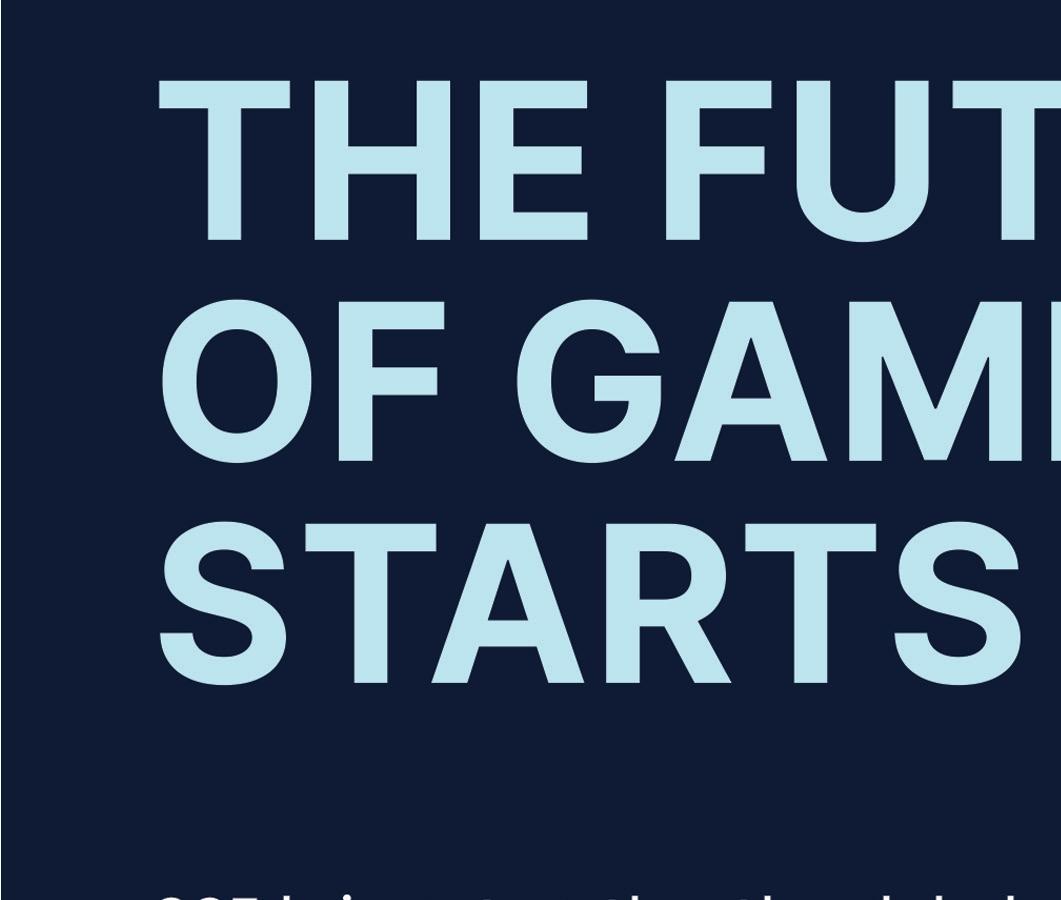



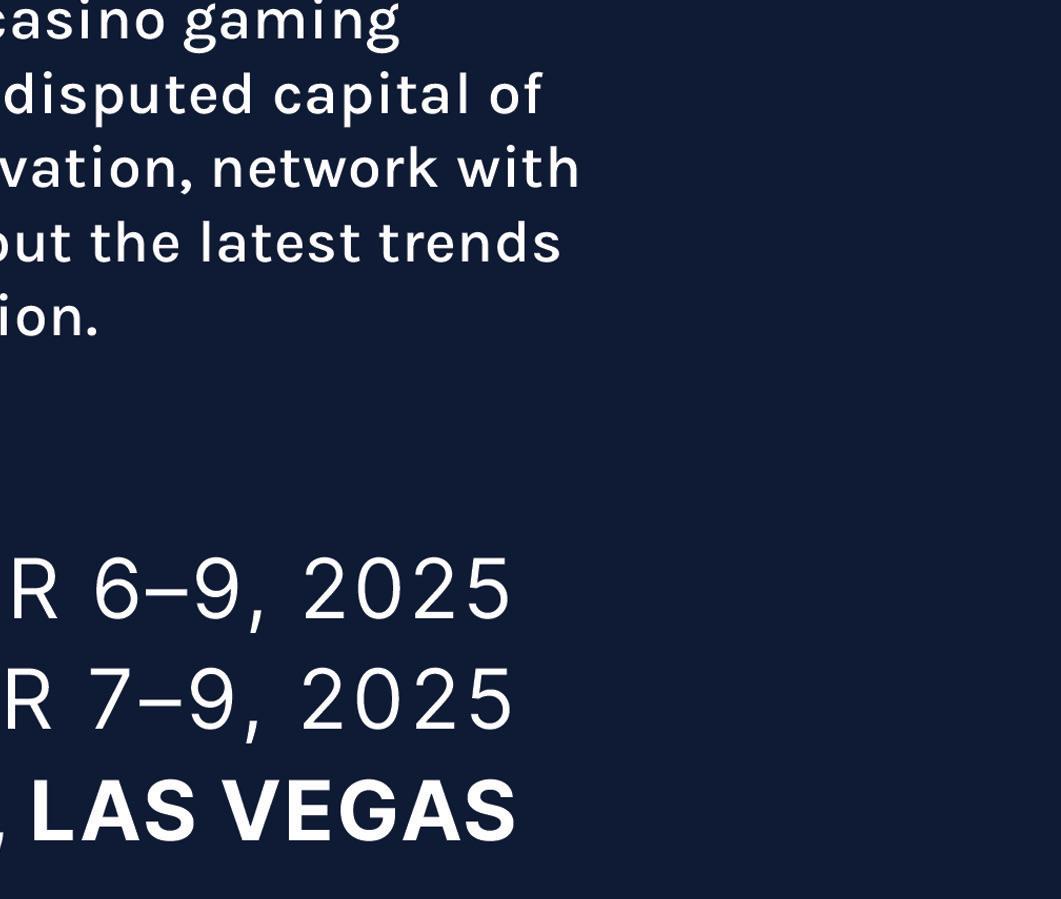




Coming o an eventful rst half of 2025, Gaming America looks at new technology and games gaining attention on casino oors.
There is a new dawn happening at Eclipse Gaming Systems with the release of the Callisto, an exclusive new cabinet designed specifically to showcase the company’s next generation of games. Four of those titles have been announced, with many more to come in 2025 and beyond.
The Callisto features an industry standard 49-inch 4K floating glass display and a 13-inch LCD button deck alongside dual bash buttons. The elegant symmetry elevates the player experience with Eclipse Gaming and immerses them in the game.
Internally, an advanced computing system
enables for peak performance and will give Eclipse game designers more power to create top-notch game content aimed at entertaining players in the Tribal gaming market.
Development Officer Russ Witt said.
“This new cabinet highlights the incredible work our team is doing and a significant investment as a company as we continue into an exciting future. The Callisto is just one of the many exciting announcements coming in 2025.” multitude of cues within games, as well cabinet to thrill and delight players.






The Callisto also makes a strong visual impact with fully interactive lighting designed to engage the player. LEDs respond to a multitude of cues within games, as well as other actions such as depositing funds. Merchandising packages level up the Callisto even further, including dynamic wedges to extend the lighting impact beyond the cabinet to thrill and delight players.


“Launching the Callisto is a proud moment for us at Eclipse,” Eclipse Chief Business
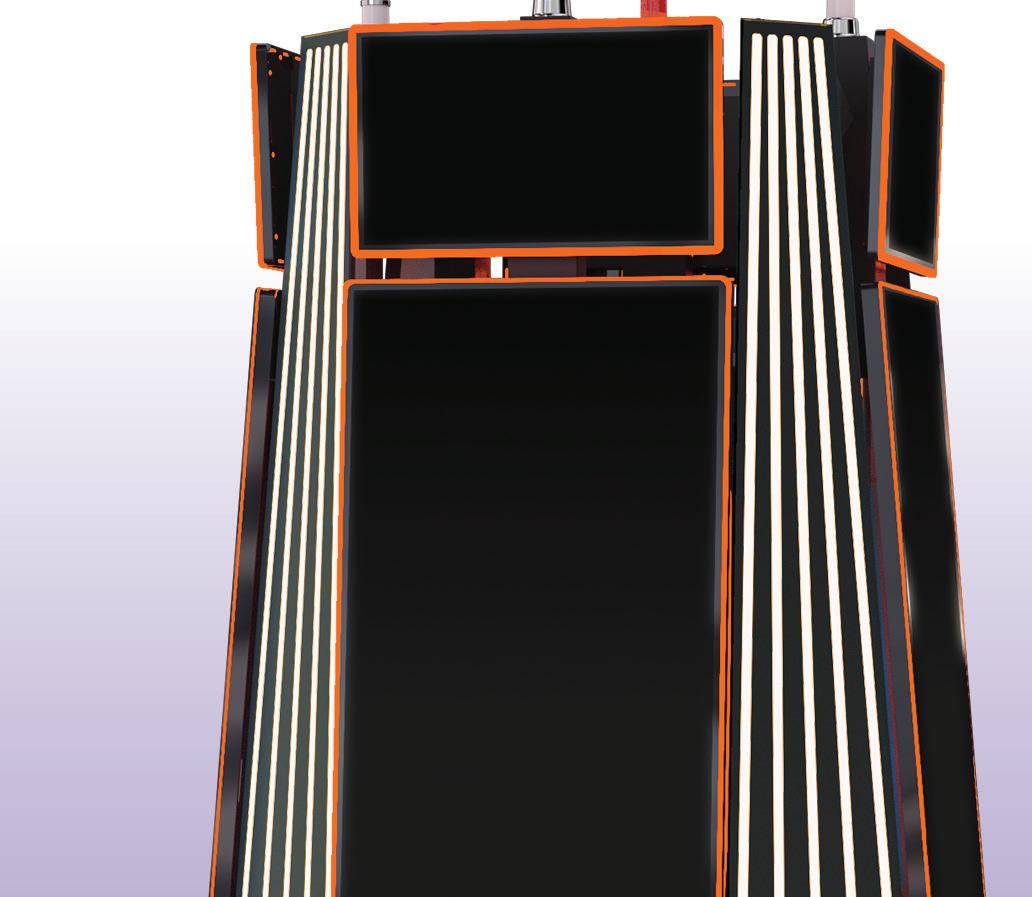



Everi is a leading Financial Technology and Loyalty services provider for the gaming, hospitality and sports & entertainment industries. The solutions developed by Everi emphasize convergence and connectivity across product lines while highlighting Everi’s ability to enable secure, mobile-first self-service capabilities throughout the patron journey.
Designed for optimized player engagement, Everi’s BeOn Casino platform extends the casino floor to a patron’s mobile device with solutions bundled into a full mobile experience. Combining gamification, loyalty, payments and data insights, BeOn is the turbocharger for the
operational engine and guest experience, as it puts the power of self service in the guest’s hands.
Core functions of BeOn Casino includes integration with Everi’s CashClub Wallet –now available in Nevada – for cashless gaming, extensions of the operator’s loyalty program, property content management tools and additional opportunities through BeOn’s Marketing Technology stack (MarTech). The mobile services provided by Everi are system agnostic, creating a seamless integration of technology across the operator footprint.

Featuring integrations with over 75 partners, BeOn assists with operator efforts to reach patrons across all touchpoints and segments by offering choice and
convenience. The platform is flexible enough to provide customer experiences that are unique to the gaming space.
Everi continues to support operators in their initial or ongoing digital transformation with strategies to engage patrons at deeper levels and improve operational efficiencies.
The “BeOn Mobile Web Portal,” Everi’s latest digital solution designed to extend key mobile functionalities to a web-based platform, provides a seamless and unified experience for both mobile app users and non-app users. This platform enhances casino operators’ digital presence by offering patrons accessibility through a web interface, ensuring engagement anytime, anywhere with integrated mobile loyalty enrollment capabilities.


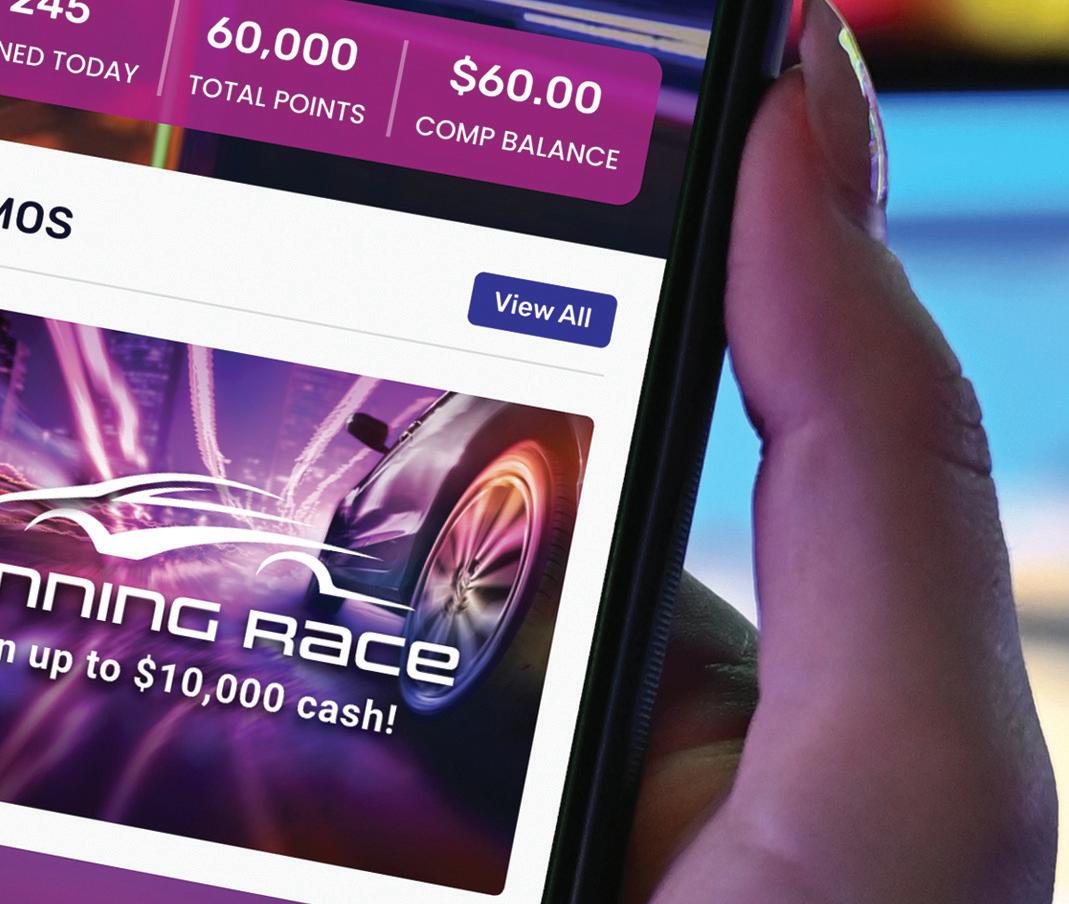






Building on the farm frenzy of Cluck Cluck Cash and Moo Moo Madness, Moo Cluck Oink brings even more excitement with a never-before seen character, Oink the pig. American Gaming Systems (AGS) pairs its beloved Cluck and Moo characters with Oink to create an on-trend, three pot Hold & Spin game that players all know and love.
In addition to its lighthearted farm animal theme, lively soundtrack and vibrant colors, Moo Cluck and Oink star in three bonus rounds, all of which can be combined. With every spin you’ll feel like you’re right on the farm, collecting spins and making a fortune with every moo.
Moo Cluck Oink is a 3x5 layout with player selectable denomination. It also has two progressives and two bonus prizes that scale with total bet. There are three bonus features that can be combined, plus a unique Tractor Bonus Feature.
The unique Extra Tractor Bonus offers a chance to improve bonus triggers, win progressives or land additional cash on reel symbols.
Powered by high-performing Class II and Class III slot games, standout service and game cabinets, an award winning table products portfolio and popular social and iGaming presence, AGS offers unmatched value for casinos.
